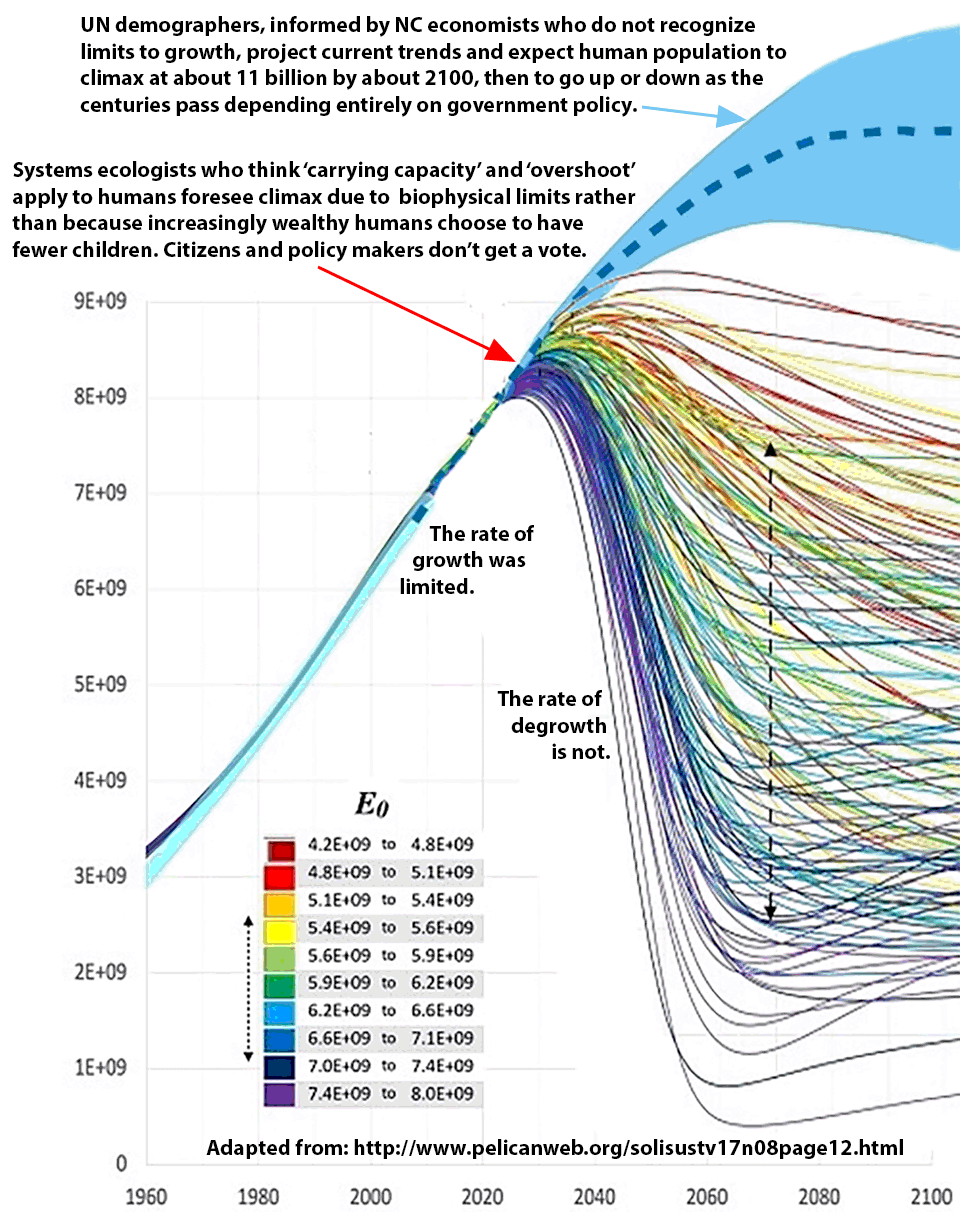.

TUESDAY, DEC 14, 2021: NOTE TO FILE

Quora Q&A 7
More info offered
Eric Lee , A-SOCIATED PRESS
TOPICS: QUESTION EVERYTHING, FROM THE WIRES, TENATIVE ANWSERS
Abstract: So another fifty pretend answers offered. Few comments and no corrections offered, so I only learned from such research as I did for each answer. The number of views is of unknown meaning. The number of upvotes may be interpreted to mean at least that many peple read the answer. Quora changed the graphics, so the series ends .

COOS BAY (A-P) — So answers starting with 301 follow and may be of interest to someone someday. Answers are not really mine. I reference some human sources. If the source, the data, is correct and the interpretation is valid, then Nature answers the question. As 'people would rater believe than know', answers that few or none Like or Share will be ignored, obfuscated, denied, and if necessary the messenger will be vilified, demonized, or killed. But 'my' answers are ignored, so I'm in no danger.
Questions:
301. Can the world ever unite as one?
302. How will our spiritual evolution continue, on earth, when there isn't the large population that we now have? This is based on the apparent major downsizing that is coming.
303. If you had the chance to fix human population, what would you do?
304. Why was the agricultural revolution significant in human history?
305. Is the condition of humanity getting more difficult?
306. How can voter fraud occur in enough instances to change a presidential election without being tripped up by residency records, signatures, ballot paper identification, etc.? I just cannot see it.
307. How close might humanity be to utilising science in order to conveniently live as a 100% green species?
308. Change begins with you. How can an individual who is not in a place of authority engender a societal/global change?
309. Is the world now tripolar or becoming tripolar?
310. What is the biggest decision that has ever been made by humankind?
311. Among all the problems that our society suffers from today, which one would you choose to dedicate your life to solving, why and how?
312. What extinction-level events can happen within our lifetime?
313. Listen everybody, We can figure this out together utilizing the power of the internet. What actions must the entirety of humanity take right now to create world peace?
314. How many people would it take to rebuild the human race if there was an apocalypse?
315. There are well-informed people with potential solutions to our global predicament, yet do not agree in some critical aspects. To 'save the world', what two people would you suggest meet to brainstorm in an effort to achieve a possible consensus?
316. Two decades on into the twenty-first century. Where are we and where are we going?
317. What are the requirements for a habitat for humanity?
318. What do we expect from society as a whole? What do you expect from it?
319. What are the realistic best and worst case scenarios for the environmental crisis?
320. How can a global language become a reality?
321. Why is climate change a burning issue in the world
322. What is the greatest challenge humanity has ever faced?
323. How does one properly comport oneself in society when faced with the self-inflicted extinction of one's own species?
324. The real problem of humanity (human society) is humanity (humans). Isn't it?
325. How best can world peace be achieved using a non-military approach?
326. What would systemic change look like?
327. At the current rate of change, how long do you believe it will take society to transcend our human nature and stop segregating each-other by pigmentation, appearance, wealth, political beliefs? Will it take a discovery about the nature of reality?
328. What if overpopulation never existed?
329. What do you think is the biggest problem in the world right now and why? What solution can we take to that problem?
330. At which point did humans start hurting the planet more than helping it?
331. What are the positive and negative effects of a hairless bipedal ape species becoming dominant on earth? What are the good and bad changes they have made to the earth?
332. What is the principle issue of humanity?
333. Do you believe that humanity is like a disease infecting planet Earth?
334. Where is the hope for humanity?
335. When did humanity give up with the concept of "waste not, want not"?
336. Why are we so desperate to destroy Earth?
337. How can humanity quickly "turn things around" and somehow get a major movement going, where pretty much ALL groups join in and overturn all this war, rampant, greedy Capitalism, etc.?
338. What will be the future of the human species?
339. If humanity lasted another 10-20,000 years, learned to traverse the stars, could study exoplanets in minute detail and we found not even a microbe of alien life - what would that mean for the nature of our existence?
340. Humanity is being forced to purge or die. Who would you purge, and why?
341. Is technology making us less human? What are the disadvantages?
342. Would anyone have an idea as to what the world would be like if competent, intelligent and humanitarian people were in power?
343. Is the human race just the worst of the worst invasive species--think cockroaches, English ivy, blackberries, kudzu--is that what we are to the earth?
344. Will the world end from a zombie apocalypse?
345. As a member of the global community, what is your contribution in promoting and sustaining quality of life for better generation?
346. To what extent can the apocalypse that people talk about on the internet be averted through our technological advances?
347. If you could make everyone super intelligent, would that be a benefit or a disadvantage to humanity?
348. What practical solutions do we have to tackle the growing population of our planet?
349. If human species are gone, will it benefit the Earth?
350. Why do we all act like everything’s okay (food shortages, water shortage, climate change, microplastics)?
If we lived in the world of Star Trek, the question would be interpreted as can independent sovereign planets ever unite to coexist and interact in a state of cooperative non-war? Could there be a United Federation of Planets in which no member planet could or would attack and conquer another? In fiction, yes, but otherwise only if humanity stops being modern, i.e. ends the condition of living in modern techno-industrial (MTI) society, in a global monetary culture of 195 independent sovereign nation-states. As H.G. Wells noted in 1933, 'the existence of independent sovereign states IS war' and that 'a new world order', a Modern State (singular), is needed. This would end life (our condition) as we know it, which could be the best thing that ever happened to humanity (or the worst).
The concept of ‘unite as one’ would have to be clarified. Unite nearly eight billion humans to be members of one super-tribe of individuals able to pursue short-term self interests? Among whom independent sovereign individuals or groups of individuals exists to create conflict, division? Yet a condition in which no individual or group could or would attack, rule, or conquer/subdue another? MTI humans do not trust. Their existence IS conflict. MTI complex society is not viable long term, i.e. selects for it own failure.
Perhaps ten to twenty-five reproductive pairs of humans exist (maybe more) on planet Earth who could live as one. They tend to have and raise offspring having the same ability (assume less than a 5% failure rate), i.e. that today, out of nearly eight billion humans, there exist 10 to 25 families (maybe more) such that the members of each family could live together in a community as one.
This may be hard to imagine, but we modern techno-industrialized (MTIed) humans may not be normal. Until recently (last 10k years) all of our ancestors lived in bands of 20 to 50 others, each of whom could trust other members of their band with their lives, and did (it was normal for them but on average MTI humans in the 21st century trust less than 1.0 others, including family members). Perhaps once or a few times a year, our nomadic ancestors rendezvoused with other bands of hunter-gatherers for a time in a region to exchange genes and memes. Such gatherings exceed Dunbar’s number, and so such gatherings could only be for a time before conflict and dissolution arose. During times of scarcity (stress), territorial disputes would arise and conflict could result in injury and death, but such was not the norm to be sought out and glorified. It is we MTI empire builders who have normalized war, i.e. the condition/pathology of not living as one (mostly).
A normal average woman could have 20 offspring in her lifespan. Having 2.1 children today per woman is replacement level, needed to maintain a stable population, and 5–6 offspring per woman is well within human biological norms as high childhood mortality rates requires a higher than 2.1 children/woman total fertility rate. Higher fertility rates are also needed to recover from depopulation events (e.g. mass starvation, plague, genocide), but otherwise birth rates need to be lowered or childhood mortality increased.
But can a planet of MTI humans ever live in peace (mostly) and harmony with one another and their environment (mostly) by becoming united as one? No. Life in MTI society is not remotely sustainable. But a planet without MTIed humans on it could and did for 300k years prior to the development of technology. This is not pie-in-the-sky utopian fantasia, but straight up the way it was for our ancestors (pre-empire building people not living in overcomplex societies of dysfunctional humans, aka civilization) who lived within limits as members of a co-dependent web of life on Earth because they had to (and it seemed perfectly normal).
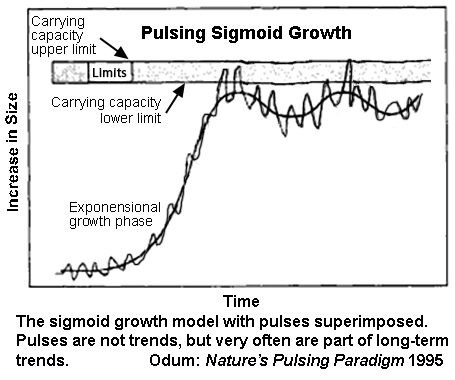
Your ancestors were normal and successful (because they became ancestors) who as K-strategists continually bumped up against the lower limits of environmental carrying capacity which lead them to moderate their enthusiasm as stressors increased (GAS, General Adaptation Syndrome) as their population approached the upper limits of their biome’s carrying capacity.
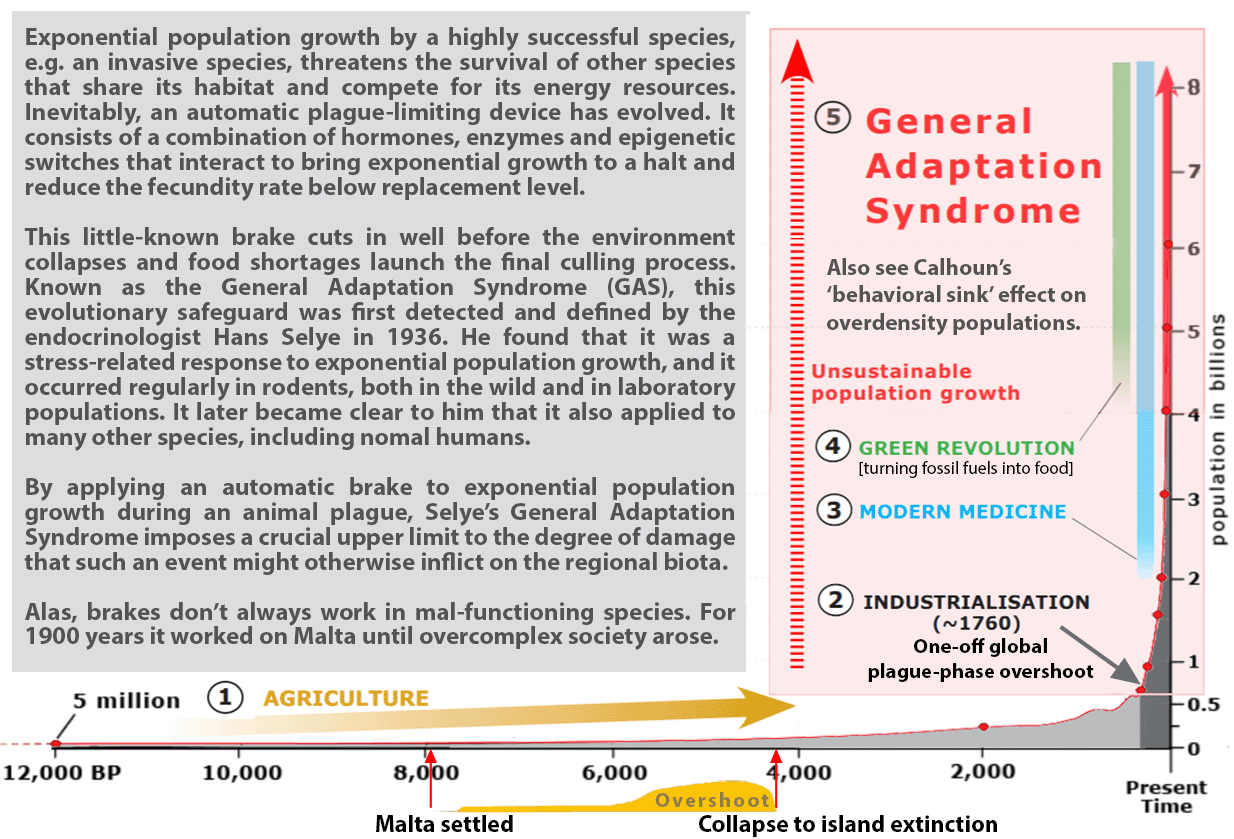
Doing so was considered natural and normal because it was. We MTIed humans see the condition that will come anyway as unnatural and abnormal. That is why we will keep on keeping on until we can’t.
We modern techno-industrialized (MTIed) ones consider living in a one-off plague-phase overshoot event to be normal. We think growth without limits is the best thing ever. We are right, but only FOR A TIME. We MTI ones lack foresight intelligence because our monetary culture selects for short-termism. Sorry about that.
We are in overshoot. Our population (and global economy) will contract. The downslope may be measured in decades, centuries, or millennia (200-500 years is common), but if humanity fails to recover from its MTI condition, if we fail to seek out the condition now that will come anyway, we almost certainly don’t have eons to figure out how to love, understand, and live properly with the planet. Don’t count on having even a millennium. One or a few centuries? One or a few decades? Maybe.
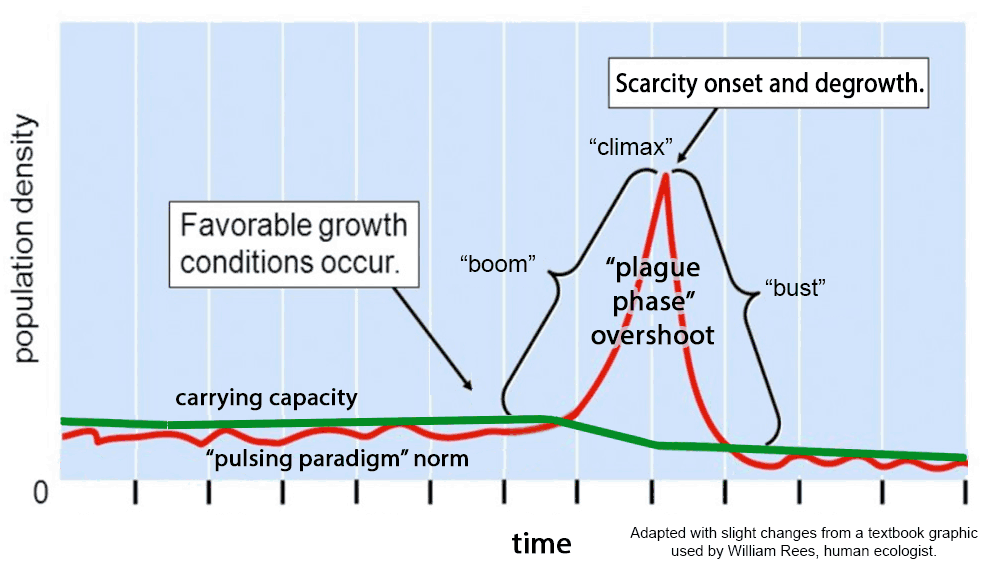
To simplify our predicament, we are like the 515,000 people living on the three islands of Malta that has an environmental carrying capacity (without significant imports) of maybe 800 people given that to live on the islands long term (as the millennia pass) room must be left for Nature who provides all services that allow for the persistence of life on on Malta (and on Earth Island). This is not a belief-based claim based on political or religious certitude. It is what Nature says to those who listen. Those who don’t listen go extinct. Could humans living on Malta (or Earth) ever live as one? Perhaps, but not as MTI humans, e.g. The Malta Solution.
"There have been seven [climate change] disasters since humans came on the earth, very similar to the one that's just about to happen. I think these events keep separating the wheat from the chaff. And eventually we'll have a human on the planet that really does understand it and can live with it properly. That's the source of my optimism." James Lovelock who envisions an 80% to 90% die-off event this century.
What might a viable alternative to MTI society look like? Nation-states replaced by 25k watershed management units that are members of a United Federation of Watersheds, within which humans manage one fifth of the area to support themselves as hunter-gatherers or low-intensity forager-farmers. On average, the population of humans is a few thousand normally living in small communities of 20 to 50 others, but meeting in a central area (monthly to annually) for a time. All would agree to defend any other watershed that might be attacked, and to engage only in sustainable trade between watershed management units.
Optimistically, there could be 25k planets bearing viable civilizations (unlike ours is currently) in the Milky Way. If travel between them was possible, and even one became (or already was) an empire builder (like MTI culture is), then the existence of one sovereign planet able to conquer another would become a state of war that would lead to a Borg-like collective, or all members of the Federation would agree to destroy the independent sovereign planet (or at least enforce its permanent containment, i.e. inability to grow by conquest). Will your descendants be Federation or Borg or go extinct in a few centuries? Near-term developments in this century may determine humanity’s outcome. The time to stand and deliver is now.
Spinoza realized that to understand something (e.g. overshoot) is to be delivered from it. If humans understood the exponential function, i.e. that growth is for a time (becoming increasingly detrimental as the lower limit of environmental carrying capacity is exceeded), then our enthusiasm for growth would be moderated. And if we understood that technology enables us to exploit a planetary larder of energy and resources (dismantle a global life-support system), then our enthusiasm for technology (e.g. cars) would be moderated. To understand is to stand down from our hubris heights. As Ludwig Wittgenstein put our options in fewer words, “Understand or die.”
The New York Times has mentioned "ecological overshoot" zero times since 1851 (one opinion piece mentioned "environmental overshoot" to deny it, zero mention of "overshoot and collapse," but "overshoot" was used 533 times. Apart from "Earth Overshoot Day", none reference our meta-problem of one-off ecological overshoot). And "climate change" (a politicized distraction from our Anthropocene overshoot event) has been mentioned over 31,000 times (over 12k in last five years, 66 times a week last year). Compared to the existential threat of climate change, our wicked overshoot problematique should be mentioned at least 666 times a week.
Do we suffer from an information deficit disorder? One caused by the formal/informal education system (schooling system) and those schooled by it? "EVERYONE believes in their own world view [Nate Hagens]." EVERYONE believes in belief and feels entitled to their world view, to allow their beliefs to competitively displace information. The more politicized, the more power/influence a person has, the less likely their views will change. Ever.
Very few people can think in systems terms. They are experts in their one area. People defer to the most respected, influential person in the room — a natural ape (clothed or unclothed) instinct. And since the people at the top are techno-optimists who think fossil fuels can be replaced with renewables at little cost by growing the economy, everyone lower in the hierarchy blindly believes likewise. Perhaps no one is sane and the modern techno-industrial consensus narrative is dead wrong, as the consensus narratives for all prior complex societies proved to be wrong.
It is "important to understand that as long as a population or species is in overshoot, it continues (by definition) to deplete resource stocks and energy-flows necessary for its own future survival. In other words, present attempts to maintain and grow the human population is destroying the biophysical basis of our own long-term existence. Present and future carrying capacity at whatever material standard/lifestyle we might choose is steadily being eroded and will continue to be so unless we dramatically, rapidly reduce demand (i.e., absolute consumption and population) or until there is systems collapse."
It is entirely possible to graduate with highest honors from a top university and know essentially nothing about ecological overshoot, carrying capacity, sustainability, or that there are limits to growth even if you are a STEM/STEAM/STREAM major. The more inconvenient truth is that most people would rather believe than know. Those who would rather know than believe, who question everything, who reevaluate all values and assumptions, who are abelievers, are some fraction of one percent. This is true for denizens of Facebook echo chambers and most think tanks to which only PhDs who have written at least several books are invited. Because the number of people who understand that we can't grow ourselves out of overshoot (the exact opposite being the case), e.g. via sustainable development, a Green New Deal, or more nuclear (and fusion and Dyson Dots at L1...), is so small and because they're just not listened to, it looks like overshoot will run its course as usual. Carrying Capacity, Overshoot and Sustainability
Our collective inability to think about the possibility that there are or ever could be ‘too many people’ on the planet has a long history that goes up to the time I am typing this. Ouora is one source of evidence. There are several questions on human ‘over’ population with over a hundred answers. Pick all of them and spend some hours scanning the answers and sorting them into sets of essentially the same answer. Do it as a citizen science project. Instead of watching another movie, updating Facebook, or going shopping..., do it.
Assume that most of those who answer questions on Quora think they know enough to have an opinion—not that they do, just think they do. So the data reflects the opinions of experts, whether academy vetted or not (as part of your study, note whether the answerer has a background in a field at all relevant to the question). Some people are more likely to know enough to have an opinion. For example, Richard Feynman is viewed pretty much by everyone who knows enough to do advanced physics as no ordinary genius. Feynman said, “Science is the belief in the ignorance of experts.”
Was he talking about self-accredited know nothing experts from the hood like me? No, he was talking about academy vetted experts like he worked with. My suggestion is that you listen to those who endeavor to listen to Nature who has all the answers. Then ask Nature questions and listen to the still small voice her data speaks. To be a bit more helpful, here’s a short, readable intro:
World scientists’ warning to humanity — Rex Weyler
Rex Weyler ends by noting: "As an ecologist, I feel compelled to ask myself: if the last 50 years of environmental action, research, warnings, meetings, legislation, regulation, and public awareness has proven insufficient, despite our victories, then what else do we need to do? That question, and an integrated, rigorous, serious answer, needs to be a central theme of the next decade of environmentalism."
The Fundamental Failure of Environmentalism — David Suzuki
On his 80th birthday, scientist and environmental activist extraordinaire David Suzuki noted that despite some victories of the David Suzuki Foundation and other efforts by environmentalists over the decades, that meanwhile "the pace of planetary destruction has not slowed ". Maybe there are no political solutions. Maybe any "integrated, rigorous, serious answer" will be wholly outside humanity's (including political activists to full-on eco-fascist revolutionary environmentalist's) current Overton window of thinkable discourse—for a time—yet know that things change, "this too, shall pass away", so learn now while access to viable information is still out there.
And always vet the source first (e.g. Weyler, Suzuki and who, if anyone, is publishing them, media bias/fact checkers are your friend and so is Wikipedia if you understand its limitations and bias). ALL UNVETTED SOURCES ARE NOT and you can't delegate the vetting. Could a source know more than you do? Maybe. If so, maybe resist letting screens distract you and consider that:
WE WERE WARNED
(longer list here)
Harrison Brown, The Challenge of Man's Future 1954
“......we are now living in a phase of history which is destined never to be repeated. For the fifth of the world population that lives in regions of machine culture it is a period of unprecedented abundance. And most of us who are a part of that fortunate one-fifth are so enamoured with the achievements of the last century and with the abundance which has been created that we believe the pace of achievement will continue uninterrupted in the future. However, only a cursory investigation of the present position of machine civilization is needed to uncover the fact that it is indeed in a precarious position. A cosmic gambler, looking at us from afar, would, in all likelihood give substantial odds in favour of the probability that it will soon disappear, never again to come into existence."
Energy resources and our future - Admiral Hyman Rickover 1957
“.... We live in what historians may some day call the Fossil Fuel Age.... Our civilization rests upon a technological base which requires enormous quantities of fossil fuels.... The earth is finite. Fossil fuels are not renewable.... Metals, too, are non-renewable resources... According to our best estimates, total fossil fuel reserves recoverable..., are likely to run out at some time between the years 2000 and 2050.... Occasionally the voice of a Cassandra has been raised only to be quickly silenced.... Prudent men will... prefer to face the facts so that they can plan intelligently for the needs of their posterity."
Aldous Huxley, TV Interview 1958
Population, Evolution & Birth Control 1964, A Collage of Controversial Readings [from Han Fei to Garrett Hardin]
A Blueprint for Survival 1972
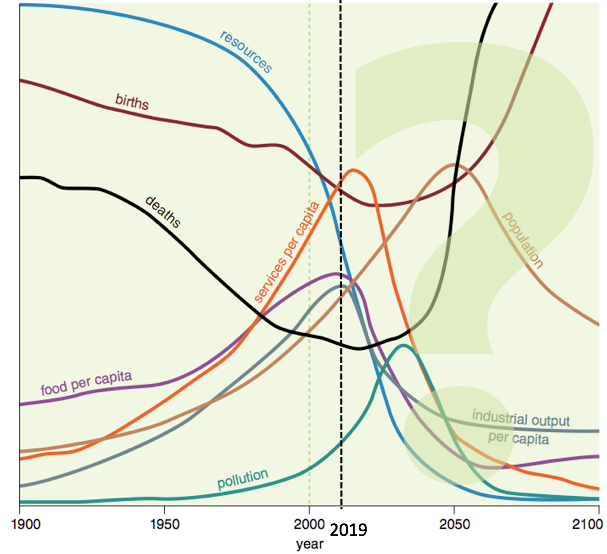
"Taking no action to solve these (global) problems, is equivalent to taking strong action. Every day of continued exponential growth brings the world system closer to the limits of that growth. A decision to do nothing is a decision to increase the risk of collapse. We cannot say with certainty how much longer mankind can postpone initiating deliberate control of his growth before he will have lost the chance for control. We suspect, on the basis of present knowledge of the physical constraints of the planet that the growth phase cannot continue...... Again, because of the delays in the system, if the global society waits until those constraints are unmistakably apparent [e.g. until 2030-2070], it will have waited too long".
Overshoot: The Ecological Basis for Revolutionary Change 1980
A Planet for the Taking 1985
An Appeal for Joint Commitment in Science and Religion 1990
Elder Brothers' Warning 1990
World Scientists' Warning to Humanity 1992
Joint statement by fifty-eight of the world's scientific academies 1993
The Anthropocene: conceptual and historical perspectives 2011
Aluna: Elder Brothers' Second Warning 2012
Consensus Statement from Global Scientists 2013
World Scientists’ Warning to Humanity: A Second Notice 2017
Worsening Worldwide Land Degradation Now ‘Critical’ 2018
Living Planet Report of 59 global scientists & overview 2019
The State of the World's Biodiversity for Food and Agriculture 2019
Nature’s Dangerous Decline ‘Unprecedented’ (IPBES) 2019
World Scientists’ Warning of a Climate Emergency 2019
A Discussion and Call to Action on Global Catastrophic Risks 2020
(38 in roundtable, Part 1: Warning. Part 2 and 3: no 'real solutions' considered as consensus limits thinking.)
Wildlife in 'catastrophic decline' due to human destruction, scientists warn 2020
Limits to Growth Updated, Harvard & Yale 2020
Tim Garrett's Audio Warning 2020
International Scholars Warning on Societal Disruption and Collapse 2020
Underestimating the Challenges of Avoiding a Ghastly Future 2021
Freshwater fish in 'catastrophic' decline 2021 BBC summary
FINAL REPORT- Delivering the Human Future 2021 No real solutions
(The world needs a ‘survival revolution’ on a scale far larger than the ‘industrial revolution’)
Global Trends 2040 (2020 may look like the good old days) 2021
WORLD SCIENTISTS’ WARNINGS INTO ACTION, LOCAL TO GLOBAL 2021
(Now yelling and swinging the 2x4 against blindered heads harder)
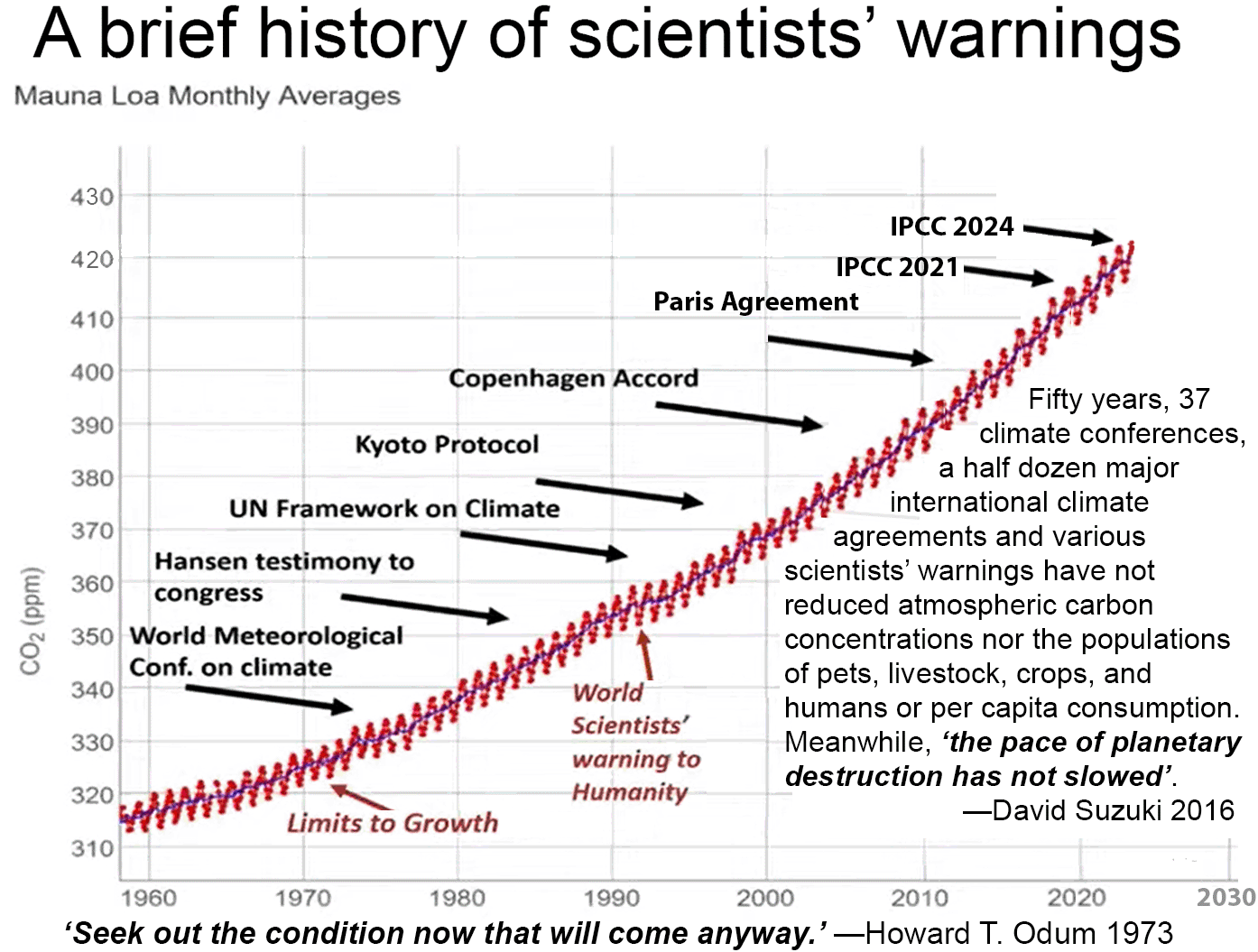
[Imagine that a world scientists' warning has a different outcome (maybe) than all prior ones. A month passes, a button is pressed and 20,736 world leaders (from top down) become unstuck in time. They have no distractions, no need to sleep, eat, breathe, have sex, or garner social approbation. For a timeless period they are intensively educated. Everything every world scientist has to teach is assimilated. The ether they inhabit is incompatible with error, and so all error associated with the warnings has been filtered out and as they now know everything that matters that every scientist had to teach, each leader far exceeds any of their individual teachers in understanding the human predicament. In the end all have triumphed over their inability to understand the implications of the exponential function. There is nothing more to learn about thermodynamics, the energetics of complex systems, carrying capacity, or overshoot. That humans are subsystems of Gaia from whom no decoupling is possible is as mother's milk to them. Thinking in systems has become child's play. In less than a heartbeat they find themselves back in their positions of power, privilege, and prestige as top government, business, media, NGO, military, university and religious leaders. All receive an invitation to join a Zoom meeting of 20,735 other leaders to discuss coming up with a plan of action to turn MTI (modern techno-industrial) society (that automatically thwarts all attempts to change its trajectory) into its opposite. The newly educated world leaders are 0.0001939% of the human population, but nearly 0.0004% of we adult hu-mans they serve or pretend to rule as leaders, i.e. 'mere puppets they, who come and go at bidding of vast formless things'.]
Update: Leaders did not grow the fossil-fueled modern techno-industrial socio-political economic system [MTI Empire], nor can they degrow it. Of the 20,736 leaders, some acted on their understanding and were rapidly selected out of the system. Others, in all knowingness, go with the humancentric flow to nudge it as best they can and thrive. After retirement, they attend Club of Rome meetings. There are no political solutions.
"In order to change an existing paradigm you do not struggle to try and change the problematic model. You create a new model and make the old one obsolete. That, in essence, is the higher service to which we are all being called." —R. Buckminster Fuller
In an alternate time line, the leaders are randomly divided into 1,728 groups of 12. Each group spends six months getting to know each other and discussing the human problematique (while adding to their understanding of it). Each group then selects a leader who can be replaced at any time by consensus of the eleven. The 1,728 leaders are randomly divided into groups of 12 who take a year to get to know each other and discuss issues. They agree upon who represents them. The 144 second cut leaders repeat the process. In a year there are 12 leaders able to make rapid emergency decisions. Of the 12 on the High Counsel, one would serve, for some hours as the supreme leader of the sapientocracy, to make decisions in extreme emergencies before the other 11 could consider the issue, whose decision would strand until the 144 could consider the issue and so on to the 20,736 representatives of each Watershed Management Unit of Earth. Only those who demonstrable knew enough (about the limits of their knowledge) to have an opinion would serve, for a time, to offer their best posterity and biosphere serving guess.
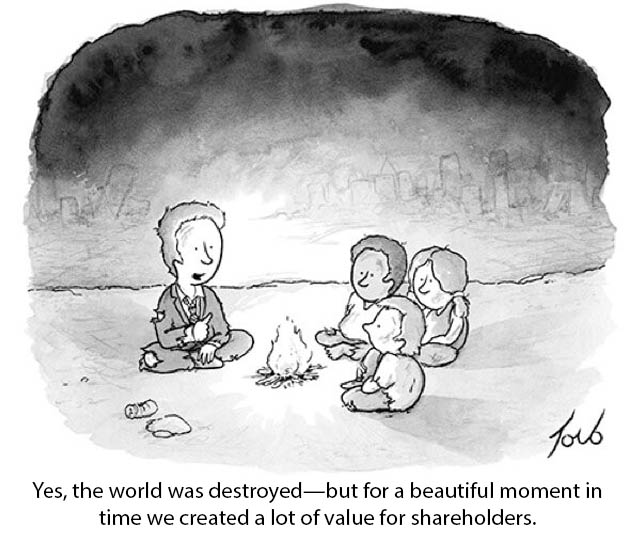
302. How will our spiritual evolution continue, on earth, when there isn't the large population that we now have? This is based on the apparent major downsizing that is coming.
[Other answers interpreted 'spiritual' and 'downsizing' other than I did, so I offered a different view. As I offen do, I may write a paragraph or few, then paste in most of the above answer by way of sharing memes I think matter.]
The currently large human and livestock population is not remotely sustainable. Scientists who understand carrying capacity and overshoot, e.g. systems ecologists, recognize that humans are in a one-off plague-phase overshoot event that must lead to a major downsizing event.
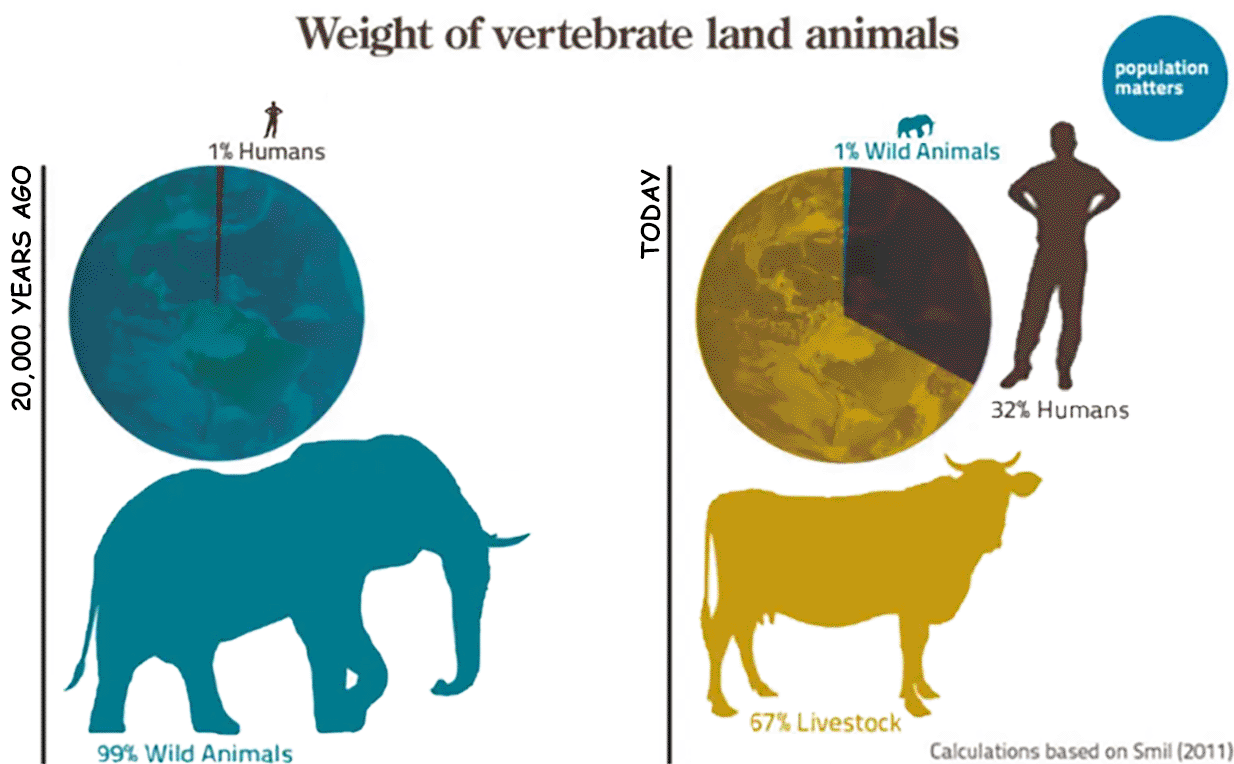
A sustainable population of humans (as the millennia pass) might be in the 7 to 35 million range, a population large enough to support ‘spiritual’ life. If spiritual behavior is selected for on the downslope, then the remnant population will be ‘spiritual’. We modern techno-industrial humans are hu-mans, Hubris Man,
My interpretation of ‘spiritual’ humans would be humans who have stood down from their hubris heights to know humilitas. Humilitas Man would be foundationally different from we modern techno-industrialized hu-mans. But the behavior selected for on the downslope (chaotic collapse) may not be adaptive long term. No one knows what the outcome of our overshoot event will be.
It is entirely possible to graduate with highest honors from a top university and know essentially nothing about overshoot, carrying capacity, sustainability, or that there are limits to growth even if you are a STEM/STEAM/STREAM major....
303. If you had the chance to fix human population, what would you do?
If I were Klaatu and could make the Earth stand still (stop human technology requiring energy inputs (e.g. cars, planes, engines, electric motors…), then I would, but not for a day just to get humanity’s attention. I would tell humans to go back to within 100 km of their place of birth within a year. Anyone further than 100 km at any time after a year would immediately die (a lights out event without suffering). This would contain the spread of the plague. Humans will not seek out the condition now that will come anyway.
Humans cannot choose to live local on environmental resources while leaving room for Nature. So, when all humans were limited to living within a 100 km radius area, they would be forced to leave room for species other than themselves, livestock, crops, and pets.
People would have to leave four-fifths of the land within a watershed area unused and manage one-fifth to support their persistence (or fail to persist). After one year of being told to pick one-fifth of a watershed area to manage, any humans outside the area of highest density on the 365th day, if any, would die. The boundary would thereby be determined by people voting with their feet, and the one-fifth would include transportation corridors between communities and buffer areas around them.
 Such limits would seem cruel and horrific to all Anthopocene enthusiasts. But the condition of global overshoot leads to climax and global descent. Unmanaged descent is chaotic collapse to dissolution, vastly more horrific than Klaatu’s limitations would involve. Sorry about that. No one gets a vote to determine the outcome of a rapid contraction of human population and per capita consumption. “Nature is unkind.”
Such limits would seem cruel and horrific to all Anthopocene enthusiasts. But the condition of global overshoot leads to climax and global descent. Unmanaged descent is chaotic collapse to dissolution, vastly more horrific than Klaatu’s limitations would involve. Sorry about that. No one gets a vote to determine the outcome of a rapid contraction of human population and per capita consumption. “Nature is unkind.”
Being forced to relearn how to live long term within a region (e.g. a watershed or sub-watershed area of a large watershed such as the Amazon or Colorado), would seem unkind, but would also be the best thing that ever happened to modern techno-industrial humans unable to limit themselves.
If no one could travel more than 100 km from a place of birth without dying (Klaatu only knows how this limit is enforced), modern war and empire building would be impossible. Global resource extraction, transport, and overconsumption would end, e.g. food would no longer travel 1,500 miles on average to get to the end of your fork.
If forced to live off of the environmental productivity of one fifth of a watershed area (per Klaatu, any human entering Nature’s four-fifth would drop dead even if yelling in protest while shaking their fist in defiance), the loss of biodiversity (the Anthropocene Mass Extinction event) would end, and in 10 to 20 million years, new species would evolve to replace those already lost.
Humans could exploit their one-fifth to the point no human could persist due to ecocide, resulting in local human extinction, but in 25k watershed management units, some humans would relearn to love and understand their biophysical economy and manage it to avoid their dissolution, i.e. they would not be posterity blind. They would replace those who failed, thus turning human society into evolvable systems again instead of complex, adaptive dissipative structures (e.g. complex societies, empires, nation-states) that select for their own failure to persist.
Perhaps in only a few thousand years humans would learn to understand the Earth system and come to live properly with it (the biosphere) by embracing limits. They might learn to have technology without being had by it. They may eventually be invited to join the United Federation of Planets that had sent Klaatu to save Earth’s life-support system from modern techno-industrialized humans.
The evidence that humans could be part of the Federation, i.e. not a threat to life in the universe as Borg-like expansionists/supremists, would be their ability to continue to manage human demands on Nature’s resources even after Klaatu ended the two limits imposed on humanity.
If worthy, humans would never again overshoot the environmental carrying capacity of their biome. They would question whether one-fifth of a watershed’s productivity was too much for one species and their plant and animal mutualists (crops, livestock, pets), and thereby come to claim less than one-fifth of ‘their’ watershed area.
All sapient humans would understand the implications of the exponential function. When humans finally came to live up to their name, the Federation would take note. When humans came to claim less that 15 percent of Earth Island within which humans lived in harmony with Nature as low-intensity hunter-forager-gardeners having but not being had by technology, living obedient to the nature of things without limits imposed upon them, the Federation would again contact Earth’s 7–35 million humans to share their knowledge of galactic systems, and wonder at what might be happening in trillions of other galaxies.
304. Why was the agricultural revolution significant in human history?
While technology enabled hominins to alter biomes using fire to favor themselves, and later force-multiplier tech (e.g. atlatl/Clovis point) to enable megafauna extinctions on five continents, agriculture enabled humans to not only overshoot long-term carrying capacity, but enabled them to live in overdensity populations that select for a loss of functional behaviors over an 8 to 12 generation period, i.e. to undergo a behavioral sink trajectory of the sort John B. Calhoun studied.
We are now, for the first time, in a one-off plague-phase global overshoot event enabled by energy flows based on a technology enabled exploitation of a planetary larder of fossil fuels. But before our modern techno-industrial monetary culture’s taking of a planet’s life-support system to reinforce short-term self interests, agriculture enabled regional overshoot and collapse due to ecological overshoot and/or civilizational overshoot due to overcomplex social systems that are not remotely sustainable.
In 1938, about 30 percent of Americans were still working to serve the agricultural sector all depended on. Now we produce vastly more food using less than 1 percent of the population who each command thousands of energy slaves that turn mostly fossil fuels into food that is then processed and transported (on average about 1,500 miles) to the end of forks. Even if all humans become devout permaculturalists committed to eating local when only sunshine again makes food, far fewer humans could be supported even if all planetary primary productivity is diverted to support humans, crops, livestock, and pets. But if humans planned to leave room for Nature (to thereby persist long and prosper), how many is a few? Maybe 7 to 35 million.
It is entirely possible to graduate with highest honors from a top university and know essentially nothing about overshoot, carrying capacity, sustainability, or that there are limits to growth even if you are a STEM/STEAM/STREAM major....
305. Is the condition of humanity getting more difficult?
The human condition is now that of modern techno-industrial (MTI) humans whose dominance is now global (e.g. China, India, Middle East, Africa, Oceania…) whose Indo-European empire-building culture has climaxed regionally in unsustainable empire building for millennia. The now global empire (Euro-Sino Empire) started in Europe (about 1450 CE) among the remnant population of the prior Greco-Roman Empire.
The condition of MTI society was once one of seeming growth everlasting in the Wood Age that transitioned into the Coal Age and then into the Oil (and Gas) Age in the twentieth century with some hydro, nuclear, PV, and wind power added (for a time).
Global conventional oil production may have peaking in 2018, but if it didn’t and there is a new peak, the belief that the pattern will continue on and on is as deeply believed in with utter disregard for biophysical reality. And for all the progressive wolves in sheep’s clothing out there, alternative energy sources will not empower MTI society to continue to overshoot planetary limits to growth.
Our condition became one of predicament or problematique in the 1950s with the start of the Great Acceleration (that will climax, followed by a Great Simplification). Our Anthropocene enthusiasm is starting to lessen slightly among the more knowledgeable, but real solutions remain unthinkable.
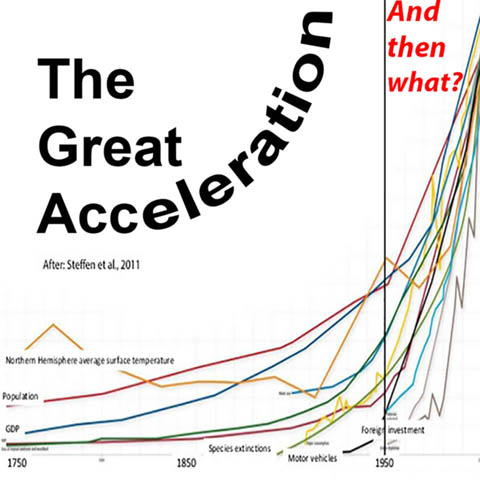 If our condition is that we are all on a giant train built to go faster and faster, and everyone is arguing about who gets to sit in which preferred seat and for how long while the engineer in the front is updating Facebook on his smartphone while heading full-speed ahead towards what looks like a wall of biophysical limits, then you might have concerns of an existential nature for humans (if not the wall). Or you might trust that the experts, highly trained specialists all, know all about complex systems that are not only more complex than we know, but more than we can know, and so you should just pick your preferred seat that you feel entitled to sit in and demand your right to sit in it NOW! And where’s that latte I ordered? That’s what I want to know.
If our condition is that we are all on a giant train built to go faster and faster, and everyone is arguing about who gets to sit in which preferred seat and for how long while the engineer in the front is updating Facebook on his smartphone while heading full-speed ahead towards what looks like a wall of biophysical limits, then you might have concerns of an existential nature for humans (if not the wall). Or you might trust that the experts, highly trained specialists all, know all about complex systems that are not only more complex than we know, but more than we can know, and so you should just pick your preferred seat that you feel entitled to sit in and demand your right to sit in it NOW! And where’s that latte I ordered? That’s what I want to know.
But some would rather know than believe. They are unable to believe even in belief. And they question everything, including whether they actually know nothing (or anything). Is it possible to be wrong about everything? Okay, almost wrong about everything you think you know, but if by chance you were right about something, how would you know?
Are things likely to get better and better as we get smarter and smarter at inventing new technology like putting arrays of Dyson Dots at L1 to manage Earth’s climate and provide illimitable PV energy while we build our Dyson Sphere before going fourth to build more around all stars in our galaxy before expanding outward into the cosmos to fill the universe with wonder? Or, by keeping on keeping on for as long as possible, are we creating the perfect storm of feedback loops that will climax our overcomplex unsustainable system (followed by descent)?
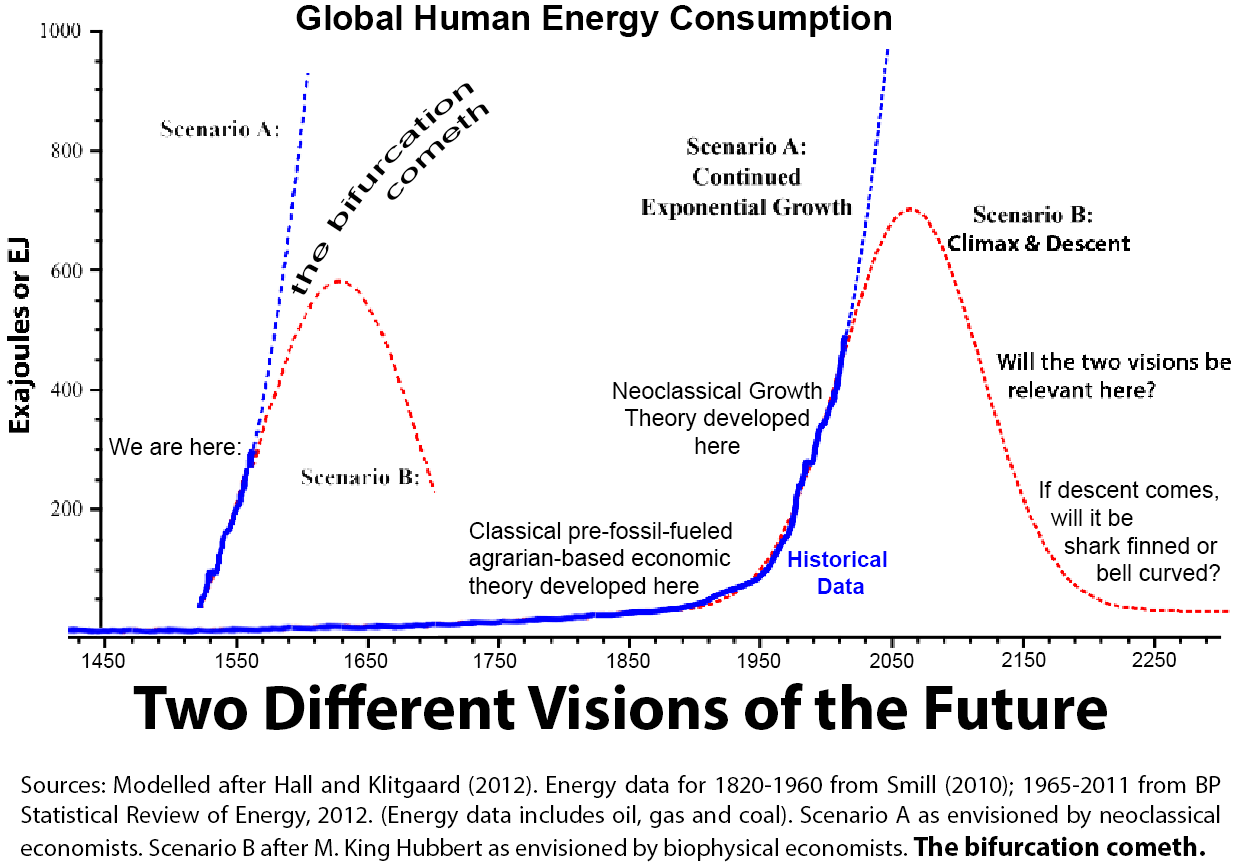
It is entirely possible to graduate with highest honors from a top university and know essentially nothing about overshoot, carrying capacity, sustainability, or that there are limits to growth even if you are a STEM/STEAM/STREAM major....
306. How can voter fraud occur in enough instances to change a presidential election without being tripped up by residency records, signatures, ballot paper identification, etc.? I just cannot see it.
There is no smoking gun evidence, but lots of manufactured facts. Quora featured one of the 100+ answers to this question after clicking on one answer in an email digest I just received to read ‘more’ that included this image:
This would be of interest if true, but a minute of quality time with a search engine is enough to know it is misinformation/disinformation. The answer has comments turned off, so correcting the misinformation is not possible. Featuring this answer with comments disabled is spreading fake news, which social media (e.g. Quora) profits from but should be punished for doing. I’m guessing that in the early days everyone at Quora agreed, “don’t do evil” like everyone else who serves the system, but this is evil incarnate. Let’s see, I have offered 429 answers, some the result of hours of fact checking and citing peer reviewed references to all claims. I can delete them all, and must seriously consider doing so. Quora won’t feature this answer (go ahead, prove me wrong). To paraphrase Mark Twain, “An internet meme can travel around the world while the truth is vetting its sources.” Post-truth norms are an existential threat to humanity (posterity).
https://www.reuters.com/article/uk-factcheck-table-voter-registration-st/fact-checktable-shows-outdated-voter-registration-numbers-for-eight-key-states-idUSKBN27L2Y8
307. How close might humanity be to utilising science in order to conveniently live as a 100% green species?
To live as a 100% green species we would have to stop causing species extinctions and leave room (contract our footprint) for new species to evolve over the next 10 to 20 million years to replace those already lost in the Anthropocene mass extinction event and those soon to be lost, i.e. we would have to contract our economy and population to be well within the carrying capacity of the planet’s life-support system. Technology is not the solution. Love and understanding are.
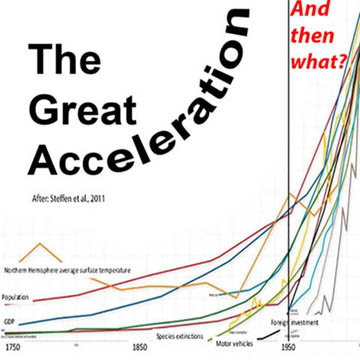 We have the science (e.g. systems ecology, human ecology, biophysical economics) to do so, but not the sapience. The planet of the humans (for a time) is being run by crazed storytelling animals who believe in (and vote for) their stories even though awash in error, ignorance, and illusion while happily splashing about (for a time) in it.
We have the science (e.g. systems ecology, human ecology, biophysical economics) to do so, but not the sapience. The planet of the humans (for a time) is being run by crazed storytelling animals who believe in (and vote for) their stories even though awash in error, ignorance, and illusion while happily splashing about (for a time) in it.
We are modern techno-industrialized humans of NIMH who value science ‘for the milk, and cheese, and profit’ it brings, but otherwise rail against or ignore scientist's warnings (or agree if they happen to support ones political agenda/tribal narrative). With the advent of the Great Acceleration about 1950, scientists who were paying attention (e.g. Harrison Brown, H.T. Odum, Garrett Hardin) where also asking ‘and then what?’ The answer is that overshoot leads to climax and to a Great Simplification (collapse).
Oh, but nobody likes this story. Stories of Growth Everlasting feel so much better.

It is entirely possible to graduate with highest honors from a top university and know essentially nothing about overshoot, carrying capacity, sustainability, or that there are limits to growth even if you are a STEM/STEAM/STREAM major....
308. Change begins with you. How can an individual who is not in a place of authority engender a societal/global change?
Ted Kaczynski (transferred to hospital yesterday, age 79), the Unabomber, wanted to engender global societal change by getting his essay ‘Industrial Society and Its Future’, read by basically everybody who could read. He wanted to destroy modern techno-industrial society because it was destroying humanity (and the biosphere) for reasons he wanted to detail (share) to see if there were enough other people out there “to take up arms against a sea of troubles, and by opposing end them”.
There weren’t, as it tuned out, but if he hadn’t done what he did to make himself near the top of the FBI’s Ten Most Wanted list (and thereby be in a position to get The New York Times and The Washington Post to co-publish his manifesto, who would/could have known?
And Gandhi was an unknown (had no authority) lawyer in South Africa when he used Thoreau’s ideas of civil disobedience to start a mass movement that did empower him to make societal change, But if you’re not the right person in the right place, planning to start a mass movement may not work, nor if it does, have the outcome you intend (i.e. it could make things worse).
As an individual, your most likely path to change is to change yourself such as to no longer be part of the problematique of modern techno-industrialized humans. Doing so is non-trivial. You can’t buy a how-to book for dummies to liberate yourself from the condition of being the problem. You may iterate towards liberation (understanding) by questioning everything, all narratives, all human prattle, all tales told by idiots that signify nothing, especially the ones your conditioned (educated) brain keeps on repeating.
Doing so will be a good start. But if you happen to come up with real solutions that could actually work to engender global societal change, don’t expect anyone to Like or Share them, because, well, most are products of the modern education system who can maybe question where the latte is that they ordered.
When you realize you know nothing (for sure), especially cogito ergo sum, then you can begin to listen (to Nature who has all the answers). To think is to listen to the still small voice of what’s out there in front of your pugged-nosed face (and the voice in your head behind your face before it comes out of your mouth or taps on a keyboard).
If you could firm up your grasp of reality, then maybe you could help humanity wake up (but not in a Woke manner). Maybe or maybe not, but some humans have to give it their best shot before we hit the wall of biophysical limits. Yes, Virginia, there are limits. The idea seems crazy, like overshoot and carrying capacity having anything to do with modern techno-industrial humans whose technology (economy) fills the universe with wonder. But Nature doesn’t care what we believe in or don’t believe in.
It is entirely possible to graduate with highest honors from a top university and know essentially nothing about overshoot, carrying capacity, sustainability, or that there are limits to growth even if you are a STEM/STEAM/STREAM major....
309. Is the world now tripolar or becoming tripolar?
To some extent now, but also becoming tripolar, as George Orwell foresaw in 1949. The reason is that as H.G. Wells noted in 1933, 'the existence of independent sovereign states IS war'. This is not a sustainable condition with 195 sovereign nation-states. What could be stable is a tripartite system of three superpowers (plus their allies who pretend to be independent) who continuously engage in war with each other, but confined to disputed areas so no serious damage is done to the economy of each. Malcontents can be sent to the front to prevent civil war.
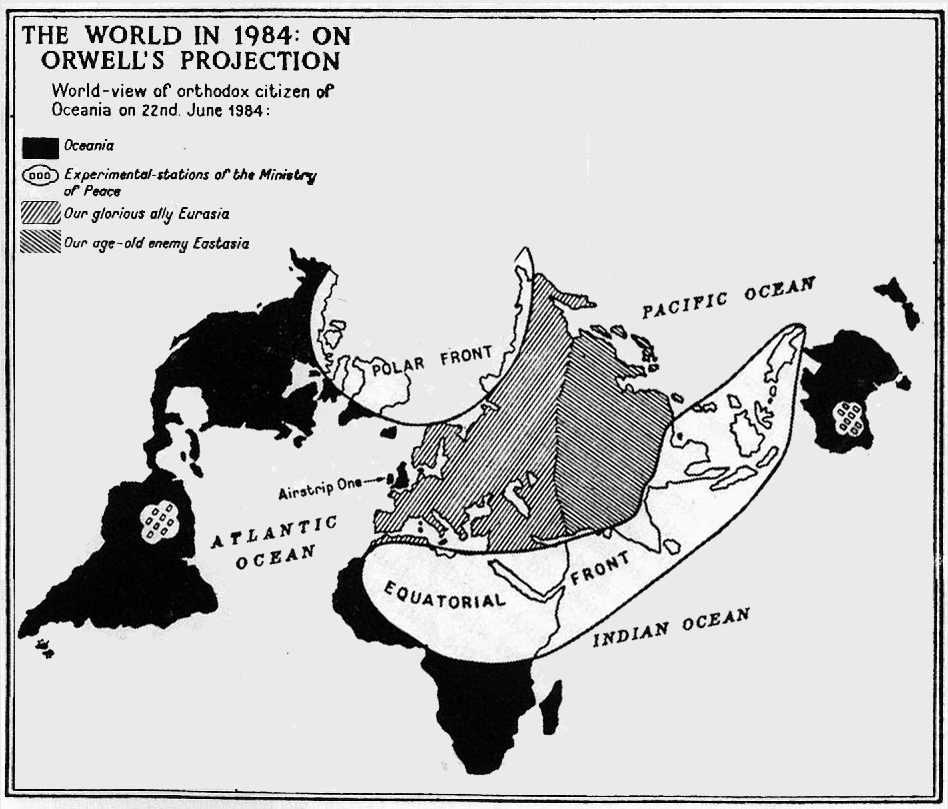
If only one superpower, then internal conflict (civil war) would plague/destroy it. If two, one would eventually defeat the other, then be torn apart by internal conflict. But with three, the two weaker can form an allegiance to prevent the strongest from conquering either. When the strongest weakens and one of the two former allies become too dominate, a new allegiance forms to keep it in check. Thus a condition of sustainable war can exist in which none of the three can ever conquer either of the other two.
http://www.sustainable.soltechdesigns.com/endgame-2184.html
310. What is the biggest decision that has ever been made by humankind?
[Most answers that reference overshoot or carrying capacity get essentially the same answer. I answer the question a paragraph or few, then paste in the rest that starts: "It is entirely possible to graduate with highest honors from a top university and know essentially nothing about overshoot, carrying capacity, sustainability, or that there are limits to growth even if you are a STEM/STEAM/STREAM major....". I usually don't include them in this archive. One recent one got 18 views. The following one, for no reason I can see, got over 16k views and 27 upvotes. For being not as usual, I'll include my answer.]
The biggest failure of humankind, as viewed from the 22nd century, may be our “decision” to ignore scientist’s warnings that began in the 1950s, climaxing with William R. Catton, Jr’s, summary of concerns in Overshoot: The Ecological Basis of Revolutionary Change, which was widely read and then ignored.
By the 1990s a consensus narrative had emerged that The Limits to Growth book of 1972 had made predictions that failed to come true (it didn’t), and so concerns about “limits” could be dismissed. Human ecologist Garrett Hardin tried to warn those who could read, but a consensus arose that his “over” population concerns were due to his being a racist (he wasn’t) who wanted to kill black babies.
It is entirely possible to graduate with highest honors from a top university and know essentially nothing about overshoot, carrying capacity, sustainability, or that there are limits to growth even if you are a STEM/STEAM/STREAM major....
311. Among all the problems that our society suffers from today, which one would you choose to dedicate your life to solving, why and how?
First, ask Nature (who has all the answers) what humanity’s meta-problem is (if any), the problem of which the others that define our problematique (those that are existential threats), our human predicament, are symptoms or sub-problems of. For example, is climate change the greatest existential threat we/posterity face?
Many seem to assume that if the climate change problem were completely solved, perhaps by putting Dyson Dots at Lagrange point L1, that shaded Earth (or not) to manage climate forevermore (and generate more energy than currently used, making it ‘too cheap to meter’), that our problems are solved and we can keep on keeping on growing the economy until everyone can live like Americans. If you don’t know enough to listen to Nature, then listen to those who endeavor to listen to Nature, i.e. the scientists and evidence-based scholars.
For example, ask Albert Bartlett, who from 1968 to 2013 (when he died) gave the same public lecture (free) 1,742 times on the meta-problem he had dedicated his life to solving. To quote him: "The greatest shortcoming of the human race is our inability to understand the exponential function." And his Great Challenge:
"Can you think of any problem in any area of human endeavor on any scale, from microscopic to global, whose long-term solution is in any demonstrable way aided, assisted, or advanced by further increases in population, locally, nationally, or globally?"
E.O. Wilson is another. He died yesterday, so to celebrate his life’s work I will quote him. “For the first time in history a conviction has developed among those who can actually think more than a decade ahead that we are playing a global endgame. Humanity's grasp on the planet is not strong. It is growing weaker. Our population is too large....” — Edward O. Wilson, Half Earth: Our Planet's Fight for Life 2016
 One word references what both are concerned with: overshoot. About 1950, the Great Acceleration kicked in. Scientists who were paying attention wondered, ‘And then what?’ The answer is overshoot and collapse. Beginning in 1954 they started warning humanity. Humanity ignored them. Millions read their books/warnings, but then did nothing because they couldn’t.
One word references what both are concerned with: overshoot. About 1950, the Great Acceleration kicked in. Scientists who were paying attention wondered, ‘And then what?’ The answer is overshoot and collapse. Beginning in 1954 they started warning humanity. Humanity ignored them. Millions read their books/warnings, but then did nothing because they couldn’t.
For the last eight years I have worked on the meta-problem of overshoot, of which climate change and the whole shebang of modern techno-industrial society's and monetary culture’s problems are symptoms. I’ve written over 250 ‘notes to file’ or articles, too many to read, but to pick one it would be The Malta Solution I updated last night, as I have no interest in pretend solutions to overshoot, the mother of wicked problems that few can think about, I can but try to make our problematique, and any viable solutionatiques, thinkable. But I can also fail. Sorry about that.
Why 'save the world'? I'm an animal with a life-dreven purpose. How do you solve wicked problems? Spinoza may have had some insight of value. He assumed that to understand something (e.g. a wicked problem) is to be delivered from it.
If our understanding (our paradigm) changes, then we have no choice but to change. If we don’t change our ways, it is because we do not understand. If you are an Anthropocene enthusiast and you understand that the system you depend on and serve is not remotely sustainable, then you must change. If you don't, then you don't understand, but are merely pretending to believe in words you are mouthing.
So therefore endeavor to understand (to think well). As Blaise Pascal added: “Thought makes the whole dignity of man; therefore endeavor to think well, that is the only morality.” And as the Kogi máma notes, “To think is the listen. Listen.”
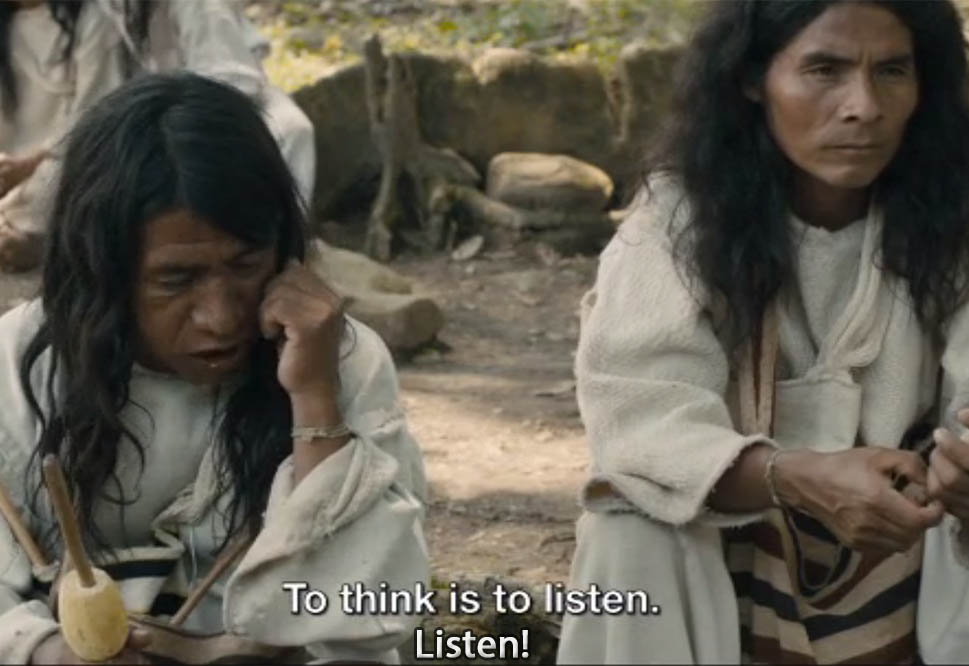
Listen to whom? “Nature has all the answers.” [Howard T. Odum, systems ecologist]. Should you listen to pundits, past or present? No. If you listen to a human, first ask, “have they dedicated their lives to listening to Nature (the nature of things)?” If not, smile and move along. Those who endeavor to listen to Nature may fail, of course, so one can but endeavor to listen to the source, to what’s out there, and not to the prattle in your head or anyone else’s. E.O. Wilson listened to ants (and Nature).
It is entirely possible to graduate with highest honors from a top university and know essentially nothing about overshoot, carrying capacity, sustainability, or that there are limits to growth even if you are a STEM/STEAM/STREAM major....
312. What extinction-level events can happen within our lifetime?
There have been eight extinction-level events (mass extinctions) and the ninth is happening now, the Anthropocene Mass Extinction event is well underway now, so climate change (barely getting started) is not the cause, but will increase the extent. Instead of a Cretaceous 78% event, we may be presiding over a Permian level extinction event. We may become part of it.
- Abiotic organic resources left over from solar system formation serve as potential energy source. Via unknown pathway, chemical entities catabolize organic matter for energy and become self-replicating. Biotic entities evolve into diverse anaerobes able to use iron, sulfur and other elements and compounds as electron acceptors for energy. Photons are consumed by cyanobateria for energy, with oxygen as a waste product leading to Mass Extinction Event I where anaerobes die off in oxygenated areas such as oceans.
- Aerobes evolve to use oxygen as energy source. Prokaryotes evolve into a community of mutualists living within a cell membrane to become eukaryotes having a nucleus. Eukaryotes evolve into multicellular organisms; some reproduce sexually. Kingdom Animalia emerges, and some survive the Ediacaran Mass Extinction Event II, possibly associated with meteorite impacts or ecosystem changes by early metazoans with oxygen drop (50% species extinction).
- Cambrian explosion in diversity, marine organisms capture carbon dioxide, levels drop as limestone deposits form causing global cooling and deoygenation resulting in late Cambrian Mass Extinction Event III (40% species extinction); some chordates survive.
- Some vertebrates survive the Ordovician Mass Extinction Event IV (85% species extinction) caused by global cooling and glaciation possibly associated with the uplifting Appalachian Mountains where weathering caused a significant and rapid draw down of CO2 or perhaps by a solar gamma ray burst destroying the ozone layer.
- Some tetrapods survive the Devonian Mass Extinction Event V (80% species extinction), possibly related to the expansion of terrestrial plants that used and sequester carbon dioxide decreasing the amount in the atmosphere, or meteorites, volcanism or both.
- Some terrestrial tetrapods survive the Permian Mass Extinction Event VI (96% species extinction of marine species), likely caused by volcanic eruptions increasing carbon dioxide levels causing global warming or rapid warming .may have been caused by release of methane from clathrates. Actually an organism, Methanosarcina, has been claimed to have done it. The 'great dying' resulted from rapid warming of around 10C (18F). Oceans lost around 80% of their oxygen, with parts of the seafloor becoming completely oxygen-free.
Recent research, published in Nature Geoscience (19 October 2020) provides, for the first time, a maybe conclusive picture of the underlying mechanism and consequences of the extinction and finally answers the key questions – what exactly caused Earth’s biggest mass extinction and how could an event of such a deadly magnitude unfold?The team were able to determine that the trigger of the Permian-Triassic crisis was a large pulse of CO2 to the atmosphere originating from a massive flood basalt province, the result of a giant volcanic eruption in today’s Siberia. Analyses showed that the volcanisms released more than 100,000 billion tonnes of carbon into the atmosphere, triggering the onset of the extinction. This is more than 40 times the amount of all carbon available in modern fossil fuel reserves including carbon already burned since the industrial revolution.
So, our Anthropocene mass extinction event, caused by human sprawl and rapaciousness, is unlikely to rival that of the Permian. But the added stressor of climate change, so far a minor cause of extinctions, could add to humanity's footprint enough to eliminate its descendants, posterity, which will begin a new era. - Some early mammals survive the Triassic Mass Extinction Event VII (80% marine and 35% terrestrial species extinction), likely caused by another bout of volcanic activity and global warming.
- Some early primates survive the late Cretaceous Mass Extinction Event VIII (78% species extinction), following meteor impact.
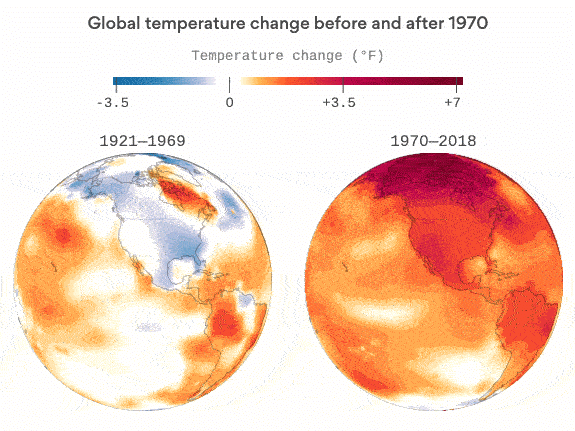 Some humans may survive the Anthropocene Mass Extinction Event IX (??% species extinction) caused by planetary life-support system degradation secondary to technology enabled consumptive growth by hunter-gatherers (e.g. intentional burns, megafauna extinctions), agrarians pulsing in regional overshoot, and fossil-fueled technoindustrial society in global overshoot . This event is also the First Mass Extermination Event of life on Earth by a carcinogenic species.. Current rate of extinction is about 1,000 times greater than before Neolithic and rate is increasing. The pace of planetary biosphere destruction has not slowed. Extinction rate may be 10,000 times greater by the end of the twenty-first century. Volcanism did not release the remnant fossil fuel reserves in Earth's crust to enhance the Anthropocene mass extinction event. It took technology enabled humans pursuing short-term self interests to do so. Overshoot leads to climax. And then what?
Some humans may survive the Anthropocene Mass Extinction Event IX (??% species extinction) caused by planetary life-support system degradation secondary to technology enabled consumptive growth by hunter-gatherers (e.g. intentional burns, megafauna extinctions), agrarians pulsing in regional overshoot, and fossil-fueled technoindustrial society in global overshoot . This event is also the First Mass Extermination Event of life on Earth by a carcinogenic species.. Current rate of extinction is about 1,000 times greater than before Neolithic and rate is increasing. The pace of planetary biosphere destruction has not slowed. Extinction rate may be 10,000 times greater by the end of the twenty-first century. Volcanism did not release the remnant fossil fuel reserves in Earth's crust to enhance the Anthropocene mass extinction event. It took technology enabled humans pursuing short-term self interests to do so. Overshoot leads to climax. And then what?
313. Listen everybody, We can figure this out together utilizing the power of the internet. What actions must the entirety of humanity take right now to create world peace?
Thanks to the power of the internet Only Two-Thirds Of American Millennials Believe The Earth Is Round.
So that implies (for the math impaired) that 33% don’t know enough to have an opinion or are certain that it is flat (4%). It is why Oxford Dictionaries declared "post-truth" its 2016 international word of the year, and why nowadays 36% of Americans get their news from Facebook. The most popular New Years resolution was to read more (by turning on subtitles and, oh, I made this last claim up, so don’t believe anything you read on your screen).
As for what all human must do to achieve world peace: agree to turn off all screens to again listen to Nature, who has all the answers, and ask what we modern techno-industrialized humans need to rapidly do to bring human demands on Nature’s resources into balance so some ten-year-olds will be able to die a natural death.
314. How many people would it take to rebuild the human race if there was an apocalypse?
About 75k years ago our ancestors numbers as little as a few thousand. According to the genetic bottleneck theory, between 50,000 and 100,000 years ago, human populations sharply decreased to 3,000–10,000 surviving individuals.
The Youngest Toba eruption was a supervolcanic eruption that occurred around 75,000 years ago at the site of present-day Lake Toba in Sumatra, Indonesia. It is one of the Earth's largest known explosive eruptions. The Toba catastrophe theory holds that this event caused a global volcanic winter of six to ten years and possibly a 1,000-year-long cooling episode.
So for how many, as little as a thousand might work, especially if the thousand were not a random sample. The problem is that an apocalypse, collapse of a human society, e.g. the Indus Valley Civilization, takes longer than those who evoke the idea allow for. Figure two centuries or 8 generations on the downslope. Life on the downslope will be very different that on the upslope (life as you know it). And life on both slopes is very different than our ancestors lived for 300k years.
Let’s say that in two hundred years the population of Earth is 5 million (same as it was 10k years ago). Those who are alive then will be the products of 8 generations who fought others to see who would inherit the rubble. Assume no one is literate, or numerate, or ecolate.
No one may be able to transition to a steady-state way of living in cooperative, trusting communities with a gifting economy able to live like their K-strategist ancestors within limits of environmental productivity as horticulturalists.
What happens in our future could be what happened to the first people who lived on the islands of Malta for 3400 years until they couldn’t. Their complex society collapsed about 2500 BCE and no one rebuilt. No one conquered them. No one survived. Their population declined, but the last few thousand became the last few hundred who were likely too dysfunctional to reproduce/rebuild after perhaps two hundred years on the downslope. The remnant population after the Indus Valley collapse that lasted about two hundred years, eight generations on the downslope, also did not rebuild. Functional humans in outlying areas moved in to rebuild. 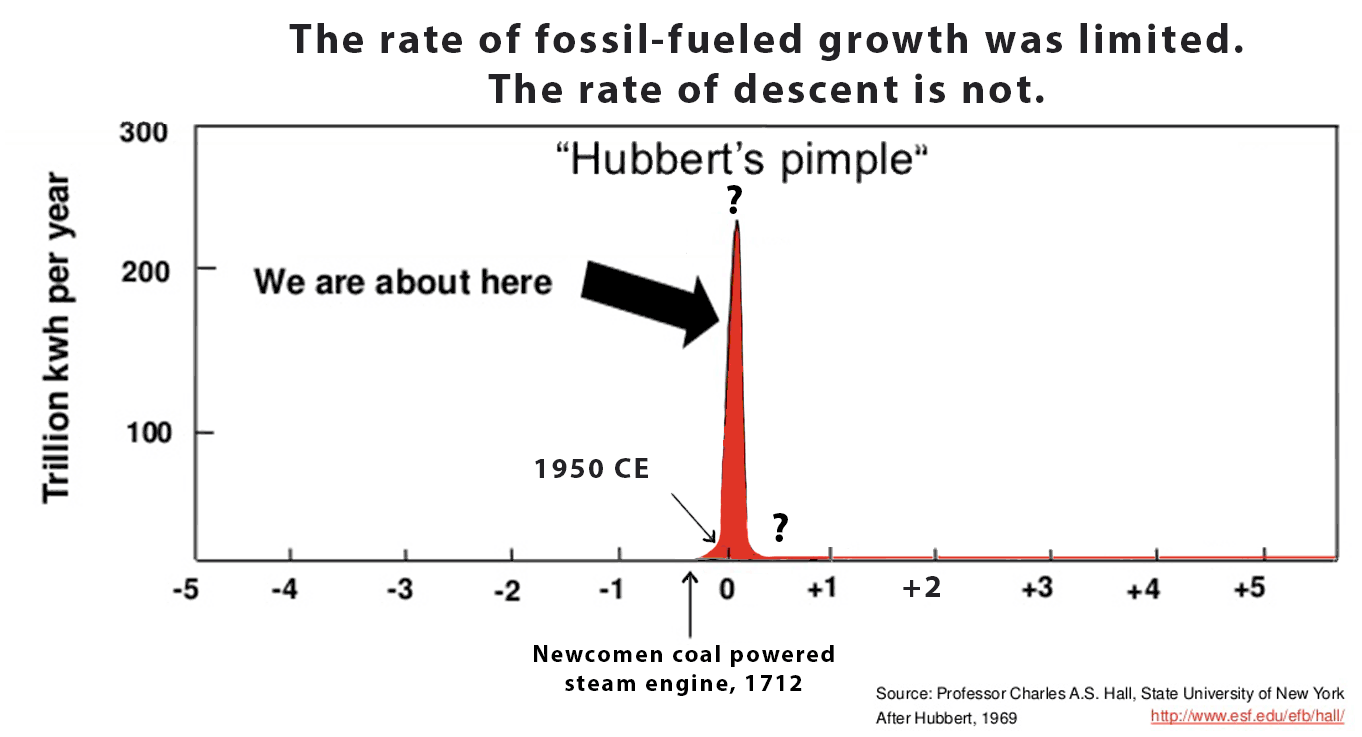
We are poised to collapse modern techno-industrial society (global monetary culture), for the first time worldwide. There are no outliers. Zombie apocalypses (chaotic die-off events) select for zombies (good at what they do on the downslope which may play out over a two hundred year, 8 generations, descent phase) who cannot rebuild to repeat the pattern of overshoot and collapse (which could be the good news for life on Earth, but bad news for ten-years-olds).
That billions of humans may die this century by starvation and conflict is a distraction, like climate change. A die-off event will get people's attention, but that won't matter. What may matter to posterity is that they exist, can exist as viable humans living within Nature (Gaia, the world system) as the millennia pass. Whether they have cars or smartphones is not important. What will be important is whether we who are alive now come up with one or more real solutions to our problematique. Malta pre-history and possible future.
315. There are well-informed people with potential solutions to our global predicament, yet do not agree in some critical aspects. To 'save the world', what two people would you suggest meet to brainstorm in an effort to achieve a possible consensus?
To answer the question: Charles A. S. Hall and Xi Jinping.
East may be East and West may be West as cardinal points, but it does not follow that twain humans from far reaches shall not meet. Charlie Hall is a systems ecologist whose mentor was Howard T. Odum. Xi Jinping is President of China, head of the CCP who are able to make changes no Western politician can. That’s why Hall would be wasting his time urging any Western politician to take action to redress the human problematique (or ‘take up arms against a sea of troubles’), i.e. humanity’s condition of ecological overshoot.
The Constitution of the People's Republic of China mandates the formation of an ecological civilization, and so everybody at least agrees with the idea whatever it may mean. Unfortunately, ‘ecological civilization’ is Chinese for ‘sustainable development’, the 1987 thought stopper from the UN’s Brundtland Commission. "With the coinage of 'sustainable development', the defenders of the unsteady state have won a few more years' moratorium from the painful process of thinking."— Garrett Hardin. The ‘ecological civilization’ enthusiasts are winning a few more years reprieve in China, but actual ecological and sustainable complex societies of manageable size will emerge or modern techno-industrialized humans will go extinct.
Xi can get things done. There’s a COVID outbreak in Xi'an, a city of nearly 12 million. Then lockdown because that’s what China’s best-guess scientists say Nature is telling them is needed to contain the outbreak. The next day, if not sooner, it is done.
The problem with ‘sustainable development’ or ‘ecological civilization’ narratives is that no one can question the consensus narrative of ‘prosperity’ and ‘progress’ by growing the economy without being handed a tinfoil hat on their way out the door. The autocracy of China could if it would. Some politicians in the West understand the human predicament because sometimes being smart and well informed helps win elections, but they can’t do anything to foundationally change the system.
As Alexander King, President Emeritus and Co-Founder of the Club of Rome noted: "I remember an occasion a decade ago [in 1983], when the Club of Rome had persuaded a dozen prime ministers and presidents to discuss world problems with us. We were agreeably surprized by the extent of understanding of the longer term issues which these political leaders displayed. Why then did they not act? At the end of the meeting one of them summed up his position by saying that they all more or less accepted the Club of Rome's position [when California governor Jerry Brown left office, one of the first things he did was go to Europe to a Club of Rome meeting], despite their ideological difference. However, were he to act on this substantially, he would be out of office, not at the next election, but in a few months. It would take his successor some years to understand the basic problems and if he reacted as he should, equally he would be eliminated politically. The only solution lies in an increase in depth and extent of public understanding of the dangers which confront us" [From letter to Don Chisholm, 1993]. The public’s understanding of the one-off overshoot event they are a part of and serve is even less now than in 1983.
President Xi must also serve the short-term self interests of members of the Chinese Communist Party (who must serve the People), or he would be out of power 'in a few months'. Kim Jong-un must serve his system as did Shenzong (Emperor of China) whose word was literally law, who was yet constrained by the system/events (i.e. unable to effect reforms). The last Emperor of Rome had to serve his Praetorian Guard until he couldn't. There are no potentates apart from the system all serve. We the People in various self-serving super-tribal forms auto-organize into competing special interest factions. Politics in all forms must end and will when enough humans (perhaps 0.01%) understand that they must cease to be humancentric (become naturcentric again or die).]
Xi Jinping was trained as an engineer and listens to those who listen to Nature (scientists). But nobody in the CCP or any thought leader or would-be thought leader can tell Xi how things really work, i.e. that there are limits to growth and that the narratives of Western conventional economists veritably, like growth, do work, but only for a time, after which the complex society, possibly with Xi still as President, will collapse.
The economy of China has been doubling about every seven years, but as Hall could explain, in the real energy-based biophysical economy, such growth can only be for a time, i.e. is not remotely sustainable, will climax, and descent (likely chaotic collapse) will follow.
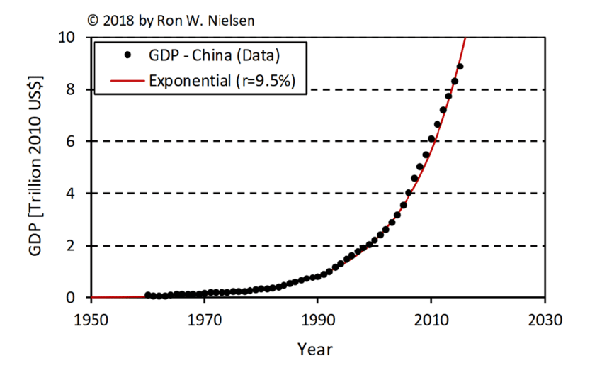
China’s GDP growth rate last years was down to only 8%, meaning it will take almost 9 years to double the economy again (unless the growth dynamic climaxes, followed by rapid degrowth).

Hall is not a servant of the consensus narratives of East or West. He listens to Nature who ‘has all the answers’ as H.T. Odum noted. He could explain that while a sustainable ecological civilization is the right idea, the precondition for human persistence on the planet, that it is utterly incompatible with further economic growth, nor a population of 1.4 billion consumers and growing (0.34%/year). The only sane response to the human predicament (overshoot) is rapid degrowth of both population and per capita consumption to match environmental productivity in a biophysical economy of enough for all while leaving significant room for Nature (the nature of things, Gaia, the world system). Of course Xi couldn’t degrow the Chinese economy (he would be replaced ‘in a few months’ if he tried), but he could establish pockets of potentially viable complex society in areas of China.
Hall might be able to educate a few Western leaders who could do nothing to change the system they serve, but maybe Xi could. He could clearly describe in a document (with help from Hall) what living in a sustainable, ecologically viable civilization (a pocket of sustainability) with a viable biophysical economy would involve.
No one would be told to read the document, but some would and the ideas would spread. He could quietly set aside regions of China and give approved modern techno-industrialized citizens the option of voting with their feet to move and live a low energy life of enough (e.g. no cars or energy slaves, but maybe bicycles) that was sustainable as the millennia pass (knowing that few would).
Anyone who still believed in growth and a prosperous life of consumption (for a time) by freely perusing short-term self interests, anyone who believed in political solutions and the value of growth, would select for the failure of the ecological civilizations, and so would be persona non-grata.
Those who agreed to vote with their feet would have to have foresight intelligence, as ‘human rights’ would be fewer and getting what you want when you want it devalued. Living in a viable ecological complex society would involving serving the ecological system as an agent, and not human short-term self interests by exploiting ecosystems as an employee in a monetary culture.
The population of an ecological complex society would be limited by environmental productivity. Full Stop. No human gets a vote. How population was limited could vary, but that it was (adjusted to per capita consumption), would be a given all who voted with their feet would agree to, a condition no Anthropocene enthusiast could agree to.
Xi could set aside hundreds of areas those who would be ecolate could go to to auto-organize, with information freely given about what might work, into complex societies within watershed areas averaging about 30 km radius in size to avoid being of unmanageable size. All would agree to limits, e.g. that they could occupy up to one fifth of the land, or less, but no more (to leave room for Nature). All EcoCivil watershed management units (WMUs) would agree to come to the aid of any other WMU that was attacked or threatened with attack. Those individuals who failed to adapt to life in a WMU could leave and go back to live in the cities (for a time).
When the global technoindustrial society/economy/monetary system collapsed, the WMUs would (having foresight intelligence) be prepared to defend their own and neighboring WMUs from the marauding hordes. By prior decree, the government, if possible, would help protect the EcoCivil areas during the transition until the government couldn’t.
As a homework assignment, one of Hall’s students has outlined what a viable ecological civilization might look like. It gives a hint of what Hall would have to say to Xi. Would Xi listen? It doesn’t matter. The question is, will even 0.01% of humans anywhere come to listen to Nature to do what is needed to persist as the millennia pass?
http://www.sustainable.soltechdesigns.com/design-viable-civilization.html
316. Two decades on into the twenty-first century. Where are we and where are we going?
Where we are is well into overshoot, short for ecological or environmental overshoot. This was clear to some scientists who were paying attention in the 1950s. By 1980, the public, politicians, and thought leaders were well informed (but came to deny, deny, deny). The summary view was written mostly in the early 1970s and published in 1980 by the title of Overshoot: The Ecological Basis of Revolutionary Change. Read it. It is even more topical now than in 1980.

Where are we going? Can’t say when, to year or even decade, but this century…. We have been riders of the Upslope for 300 years of techno-industrial growth caused not by clever apes starting the Industrial Revolution, but by turning a planetary larder of fossil fuels and resources (fish in the sea, forests, arable land, crustal resources for the taking, 99% of other mammals except livestock and pets) into humans and their industrial sprawl/waste products (e.g. toxins, concrete, bricks, asphalt, plastics, N, P, CO2).

The future is unpredictable in any details, but as a rock thrown at the noonday sun will climax and descend (even if an eagle grabbed it at its peak trajectory and flew about with it for a while), you can predict that its way up will end, transitioning to down, and it will come down from its hubris heights.
Go to a field near you and try it a few thousand times. That our world system (socio-political economic monetary society, now global) will climax and descend, is as likely as the rock coming down. Where exactly will the rock hit? Will it bounce? Where will it come to rest? How high will it go? How many times will it have rotated on its axis? I don’t know, and you don’t either. We just don’t know anything (well almost nothing).

If we don’t go extinct secondary to our overshoot and collapse event, where will we go? Basically two pathways: 1). After at least 500 years of environmental restoration (regrowth of forests, soil development, recovery of some species), posterity (likely illiterate, innumerate, and inecolate), our posterity’s remnant population will be able to form overcomplex societies to build empire again. In short, we Anthropocene enthusiasts will repeat the pattern of overshoot and collapse, just not on a global level (the Earth’s crust will have been depleted of stored high EROI net energy and readily extractable resources). 2). We could learn to understand the planet (world system) and come to live with it properly as agents of the Earth, working to maximize the empower of the biosphere (Gaia), because that’s what works long term (is what Nature selects for). Or as Ludwig Wittgenstein put it in fewer words, we can “understand or die.”
Nature doesn’t care which pathway we take. We are the first animal to store significant amounts of information in our memes instead of our genes. We have the potential to evolve memetically. But we are not doing so, we are in full devolution in our post-truth believe- whatever-you-want culture. We are a complex, dissipative, adaptive, but non-evolvable structure (pathway #1), as is a metastatic cancer that selects for its own destruction (hence is non-evolvable). Pathway #2 is an unrealized potential, that of becoming a complex, dissipative, adaptive, evolvable system (as distinct from non-evolvable structure, e.g. a whirlwind or tornado). Will we understand or die? I don’t know, and you don’t either, but the next century may determine our long term outcome.
The New York Times has mentioned "ecological overshoot" zero times since 1851 (one opinion piece mentioned "environmental overshoot" to deny it, and "overshoot" was used 533 times, but apart from "Earth Overshoot Day", none reference our meta-problem of one-off ecological overshoot). And "climate change" (a politicized distraction from our Anthropocene overshoot event) has been mentioned over 31,000 times (over 12k in last five years, 66 times a week last year). Compared to the existential threat of climate change, our wicked overshoot problematique should be mentioned at least 666 times a week.
Do we suffer from an information deficit disorder? One caused by the formal/informal education system (schooling system) and those schooled by it? 'EVERYONE believes in their own world view [Nate Hagens]'. EVERYONE believes in belief and feels entitled to their world view, to allow their beliefs to competitively displace information. The more politicized, the more power/influence a person has, the less likely their views will change. Ever.
Very few people can think in systems terms. They are experts in their one area. People defer to the most respected, influential person in the room — a natural ape (clothed or unclothed) instinct. And since the people at the top are techno-optimists who think fossil fuels can be replaced with renewables at little cost by growing the economy, everyone lower in the hierarchy blindly believes likewise. Perhaps no one is sane and the modern techno-industrial consensus narrative is dead wrong, as the consensus narrative proved to be wrong for all prior complex societies.
It is entirely possible to graduate with highest honors from a top university and know essentially nothing about ecological overshoot, carrying capacity, sustainability, or that there are limits to growth even if you are a STEM/STEAM/STREAM major....
317. What are the requirements for a habitat for humanity?
Carrying capacity: the population of a given species that can be supported indefinitely in a defined habitat without permanently damaging/degrading the ecosystem upon which it is dependent.
Humans are a species, one of an estimated range of current species from 2 million to 1 trillion (figure 5–10 million) on Earth. We will never even name most of the species who have recently gone extinct or soon will in the Anthropocene mass extinction event that could rival that of the Permian. All species share the need of a habitable planet to live on. Elon Musk may have dreams of retiring on Mars, but modern techno-industrialized humans are inecolate, swim in a vast sea of self-secreted error, ignorance, and illusion.
You may have graduated with highest honors from a top university, but not know that you need a biosphere composed of ecosystems/biomes that provide essential services (Nature is not an externality) to live in, and that there is only one planet having a biome/habitat that you could live in, maybe.
The first requirement for a human habitat within Gaia is that it must have a sustainable source of energy. Thermal deep sea vents provide energy for life, but not for human life. We need air containing oxygen without enough toxins in it to cause death prior to reproducing. Temperature must be temperate enough, and liquid water must be available.
The only energy source needed is sunlight as we omnivores are obligate consumers of green plants and to a lessor extent other organisms that are also dependent on them. Humans are heterotrophs, unlike green plants that are 84% of Earth’s biomass. Earth's Biomass
Humans came into existence about 300 thousand years ago by adapting to the African savanna, that provided all the requirements, as K-strategists. We developed technology to kill animals, but they co-evolved with us, adapted, and so the megafauna of Africa did not go extinct. About 70k years ago, we spread out of Africa as an invasive species, causing megafauna extinctions on five continents and many islands (e.g. New Zealand, Madagascar), but while we degraded our habitat and our numbers declined in local degraded biomes, we did not go extinct.
About 12k years ago agriculture began to enable regions to be simplified (replacing many plants with a few crops and many animals with livestock). This degraded the habitat for all life except humans, crops, livestock, and pets. The spread of agriculture is the main cause of today’s species extinctions. The rate of anthropogenic species extinction is now over 1,000 times baseline, heading towards 10,000 times higher by the end of this century. By about 3k to 4k years ago, growing human populations practicing agriculture were regionally causing species extinctions above baseline, hence we began to exceed carrying capacity and regionally overpulse in a pattern of empire building and collapse/descent that overexploits resources including weaker humans.
Once we have a habitat, we modern techno-industrialized humans destroy it using technology and fossil fuels to overgrow by exceeding long term limits. Growth is the best thing imaginable until it isn’t. For the first time, our overcomplex society, our monetary culture, is now global. We are near the climax of our socio-political fossil-fueled economic system that can keep on keeping on only by growing. The belief in Growth depends on the vast sea of self-secreted error, ignorance, and illusion we swim in, for a time, until we can’t.

The straight up fact in front of our pugged-nosed faces is that we are well into ecological overshoot. We all serve an economy that is not remotely sustainable because it is in our short-term self interest to do so, to do what everybody else is doing. We and our growth hegemon are the Anthropocene mass extinction event. We can come to understand the planet and learn to live with it properly as K-strategists, or die.
The New York Times has mentioned "ecological overshoot" zero times since 1851....
318. What do we expect from society as a whole? What do you expect from it?
We expect growth and prosperity to continue forevermore so we can keep on consuming stuff. We expect progress to provide evermore energy slaves to serve us. In wealthy regions, e.g. large cities, having a few thousand energy slaves serving each person 24/7 is good. Having tens of thousands will be better. Technology (we believe) will provide. Someday all humans will be able to live the good life (sustainably of course) as consumers without having to do anything else.

I expect the 99.99% to keep on keeping on until they can’t. I expect all to continue to swim in a self-secreted sea of error, ignorance, and illusion. We will tell stories other consumers will Like and Share until we can’t. We will double down on what, for a time, worked (i.e. growth). We will celebrate our post-truth world view until we can’t.
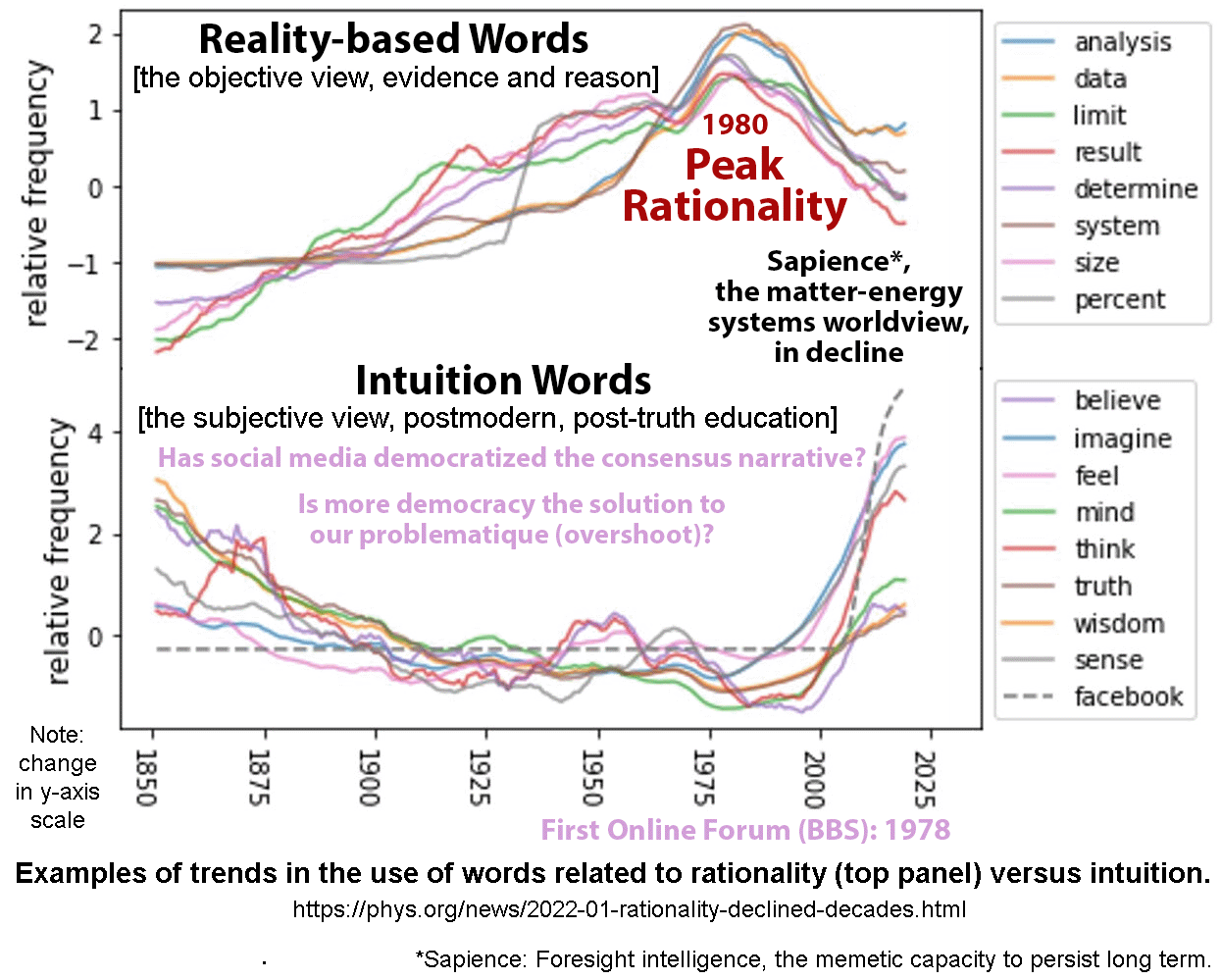
In 1712 Newcomen invented the first coal powered steam engine to pump water out of a coal mine so more coal could be mined and sent to the city (for a time) to meet human needs (wants).
The Wood Age was running out of wood. Colonists were sent to found Jamestown to build a glass factory. After the collapse of the Roman Empire, Europe was able to reforest as the centuries passed to again be mostly covered in old-growth forest (for a time).
Deforesting Europe (later America, then Brazil) created great prosperity for some and some prosperity for all (including beggars, street urchins, and serfs/slaves). Former forest soils could be planted in crops or grazed by livestock (for a time).
Great empires were built (and principalities and city-states). It took about 1,000 old-growth oak trees to build one merchant or war ship to go forth and “create” the wealth of maritime nation-states (e.g. Spain, then Britain, ruled the waves and all other European nations and former colonies wanted a piece of the action, including beggars, street urchins, and wage slaves).
But as wood (and later whale oil) was running out, a planetary larder of fossil fuel was exploited to make great machines to take more, and the modern techno-industrial society’s growth hegemon (i.e. economy), now global (the one we all live in and serve), arose to fill the universe with wonder (for a time).
It was an Empire (monetary culture) like all the prior ones, but more bigger, and it began the taking of a solar system, the first of many human expansionists (aka Borg), Anthropocene enthusiasts all, dream of taking (including those who manage to get in 11 to 13 hours a day of screen time).
I expect modern techno-industrialized humans to not understand the condition of overshoot they live in (for a time) and to die because they have no choice. We could “understand or die” [Ludwig Wittgenstein], but we collectively can’t understand. To all you ten-year-olds out there… sorry about that.
Could 0.01% of humans (1 among 10k) understand and form pockets of sustainable complex society able to preserve information packages so a remnant population could come to understand the planet and come to live with it properly as the millennia pass? I don’t know.
The New York Times has mentioned "ecological overshoot" zero times since 1851....
319. What are the realistic best and worst case scenarios for the environmental crisis?
An environmental crisis could be a drought, forest fire, hurricane, flood…, but the word ‘the’ should be followed by ‘ecological overshoot’, i.e. the condition of one-off plague-phase overshoot humans are well into, a condition of exponential growth that is not remotely sustainable, that will climax, and will be followed by contraction of our population and global economy even if no human could believe that overshoot events could happen to humans.

Overshoot is the meta-problem, the crisis, of which all systemic crises are symptoms of, e.g. biodiversity loss, mass extinction, pollution, environmental degradation, ground water depletion, climate change…. Ecological overshoot - Wikipedia

Climax follows a period of exponential growth, e.g. the last 300 years of modern techno-industrial society. Descent/collapse follows. When climax happens and how fast the descent is and how close to or equal to zero it goes is unknowable as the dynamics of the world system is far too complex for humans to predict. But that climax will come is.
The best case scenario is that some humans (perhaps 0.01%) come to understand the planet and learn to live with it properly by passing through the coming bottleneck with information packages intact as an increasingly functional complex society able to rebuild as a wholly non-techno-industrial society, a non-monetary culture whose values are naturcentric, not humancentric.
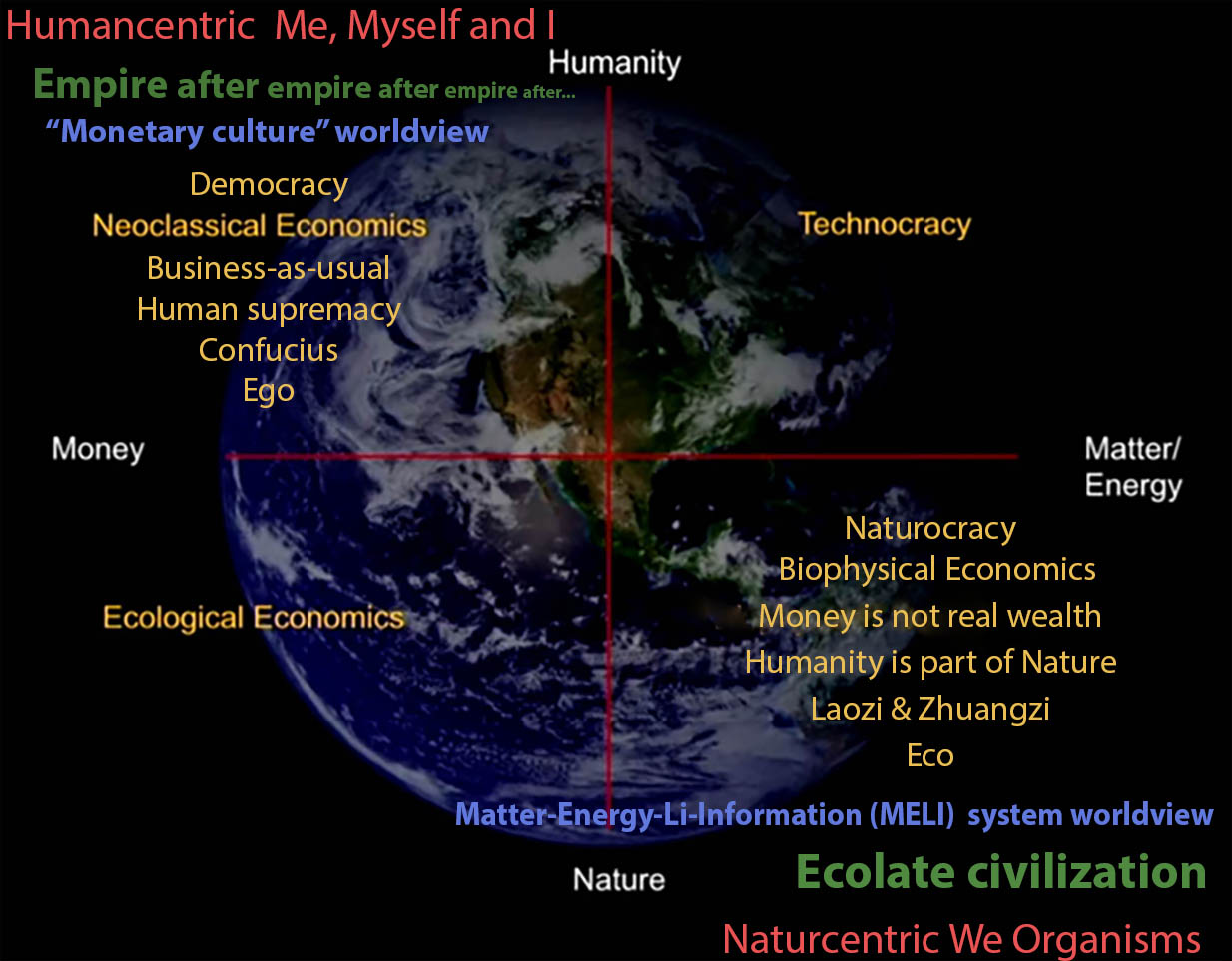
Adapted from Mark Brown, Beyond Growth: Economics as if the Planet Mattered, 2/5/2019.
"Monetary culture" vs matter-energy system worldview. —M. King Hubbert
'Li' is Chinese for the laws—organizing principles—of the cosmos.
Technocracy and ecological economics were/are transitional.
Naturocracy: Technocracy for the 21st century.
The worst case scenario is that some modern techno-industrialized humans persist to repeat the pattern of overshoot and collapse on a regional scale until they can’t. If we keep on keeping on, remorselessly degrading the planetary life-support system until we can’t (because we are extinct), then that would be a bad outcome. The outcome could be the greatest mass extinction event since the late Cretaceous (which is happening now) that becomes one that exceeds that of the Permian (95% extinction of life on Earth). Humanity is colliding with Nature. A damaged biosphere will persist. We humans may not be part of it. There are no political solutions.
The New York Times has mentioned "ecological overshoot" zero times since 1851
320. How can a global language become a reality?
People only learn a lingua franca of a dominant power to gain advantage, not to enable global communication. There are thousands of languages and constructing a universal spoken language that everyone learns, including the dominate language speakers, has never seemed of value to the dominate language speakers, so they refuse to agree that any language other than the one they speak, is worth knowing.
A constructed spoken language is not the only, or better, way to go. The Chinese written language was once the common regional language of East Asia. It is a semi-ideographic language with no spoken form, so if you are Vietnamese or Korean, or Japanese, or Cantonese, or Mandarin speaker, all can communicate using the the same written language.
Charles Bliss developed a logical ideographic language that is vastly easier to learn than Chinese hanzi. If learning his writing system served anyone’s short-term self interests, humanity could now be united by a common written language, but that would serve no one’s bottom line.
Bliss developed his language to make it more difficult for wordsmiths to obfuscate every issue and promulgate vast propaganda machines to serve special interests. Which is to say, his better idea failed to serve the system/economy/political interests. So for a global (written) language, first destroy all political powers (by ceasing to believe in them) and their economies (e.g. nation states and corporations) to form a global government to place limits on humanity's demands on Nature's (the planetary life-support system's) resources when the current growth hegemon fails (as all prior ones have).
http://www.semantography.soltechdesigns.com/
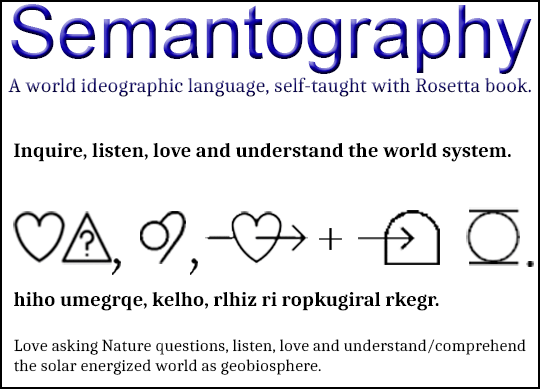
321. Why is climate change a burning issue in the world?
Because the issue has been politicized and modern techno-industrialized humans are thoroughly political animals. The dynamics of political systems select for two major factions (or a one party power system). In the 20th and 21st centuries (so far) contending democratic two party states have been better at growing national economies and so have been selected for.
Climate change is an issue, like ecological overshoot, that is objectively out there, but unlike overshoot is easy to understand, and so the party that calls attention to the science of climate change and thinks they have the answer (e.g. a Green New Deal), hopes to gain advantage by viewing climate change as a threat they alone have a solution to. They count on, assume that most people will fail to understand that the only real solution to climate change (a symptom of overshoot) is rapid degrowth of all economies and all populations of humans, livestock, crops, and pets. But nobody likes real solutions or information about our overshoot problematique, so all political animals avoid thinking about so called ‘overshoot’ that may apply to mere animals, but not to humans who are different in kind from all other animals, i.e. we are exceptional and the laws of the universe (e.g. thermodynamics) don’t apply to us.
Of course the other party knows that everything their enemy says is false, a lie, an attempt to gain power (it takes one to know one). So denial is automatic, and mountains of evidence can easily be dismissed by equal and opposite evidence piled high and deep.
Political animals would rather believe than know, and those ‘for’ or ‘against’ any issue (e.g. climate change, a free market) are utterly unable to evaluate evidence nor reason about it, whether ‘for’ or ‘against’, as their conclusions determine what their reasoning (and what evidence they believe in and cite) shall be.
Only some scientists (a minority, at most 30% as about 61% self-identify as liberal and 9% as conservative) are apolitical and have no prior conclusions to determine what their reasoning shall be (i.e. they would rather know than believe). Of those, a few realize that climate change is a distraction from the meta-problem of ecological overshoot.
The New York Times has mentioned "ecological overshoot" zero times since 1851....
322. What is the greatest challenge humanity has ever faced?
[Quora deleted this question as I was answering it. It is a few paragraphs and then the usual ending, so I wasn't going to added it here.]
Humanity’s greatest challenge, as the ancient Greeks noted, is hubris, standing down from our hubris heights before the fall. So far we have repeatedly failed and so collapse has been unmanaged, chaotic, and lamentable each time until we forget the past within a few generations and repeat the pattern of overshoot and collapse. We have built empires, from chiefdoms to nation-states, numbering in the thousands, but all prior complex societies (aka civilizations) have fallen, collapsed, been conquered by nearby empire builders, or in a few cases faded away if there was no one to conquer them.

We are living, for a time, in the first global empire lording over, for a time, a planet for the taking as we are, for a time, empowered by a planetary larder of fossil fuels we use to turn into food, humans, livestock, pets, industrial sprawl, and future ruins.

We are nearing the climax of our conquest, an overshoot event that is causing the greatest mass extinction event since the late Cretaceous, one that could rival that of the Permian. We are Lord Man , Anthropocene enthusiasts all (for a time, a few are merely less enthusiastic than others).

We can ‘understand or die’. Dying is easy, the default solution. Understanding the planet and learning to live with it properly is possible in that it would violate no known laws of the universe. Believing that we can keep on keeping on does.
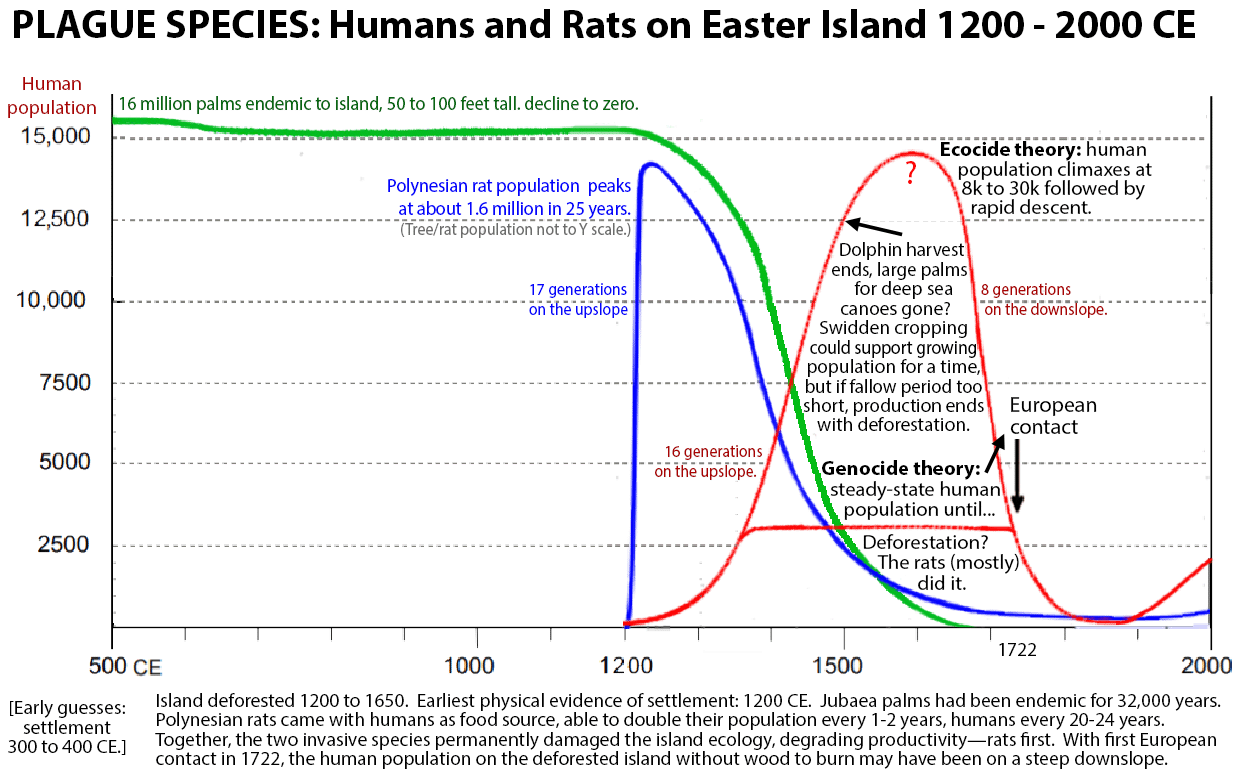
We could do something different , even though we humans never have before. But this time we are in a position to understand our predicament, and despite a global schooling system, some humans have foresight intelligence that could enable them to act to design, and make so, a viable ecolate civilization .

The New York Times has mentioned "ecological overshoot" zero times since 1851,,,,
323. How does one properly comport oneself in society when faced with the self-inflicted extinction of one's own species?
[Actually an answer to two questions, one from a different answer: "What idiot told you we are becoming extinct? There are around 83 million more of us today than there were a year ago. Hardly an existential crisis." from someone who claims to be "Ranked top 1% of researchers on Academia.ed" which is true, he's a freelance writer, BS chemistry, MS Human Resource Management, currently Global Head of Marketing Content and Thought Leadership for Thoughtworks (IT services), so I reacted....]
The society would be modern techno-industrial society, nearly a thousand years in the developing, beginning among the remnant population of the Roman Empire after forests and soils had recovered enough to support another pulsing of empire building. How should you comport yourself within it? Abandon it, taking such information as may be of value.
It took about a thousand old-growth oak trees to build a merchant or war ship in 15th century Europe. The Euro empire would have ended with the Wood Age that empowered it, but fossil fuels enabled its continuance and global spread. Today, fossil fueled growth has shifted to the Sino region.

There are many idiots who cannot understand the implications of the exponential function, being products of the modern education system. Few can think that adding 83 million more babies a year than humans who die, could be bad news for 10 year olds.
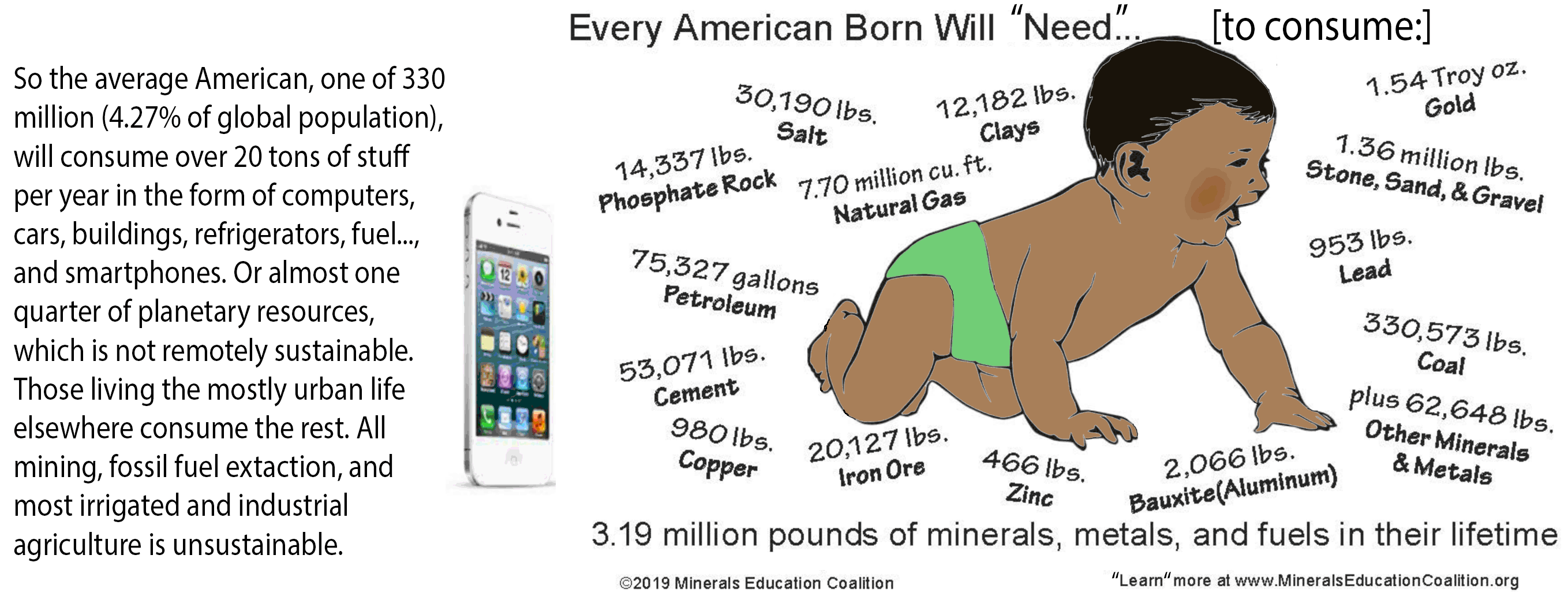
Will today’s 70 year olds see the global system climax and descend? In 1972, when I read Limits to Growth, I realized I could live long enough to see the system climax. Best guess then was climax sometime about 2030 to 2070, This guess assumed the business-as-usual scenario, which is what the last 60 years have been, so some idiots I know, systems ecologists, professors emeritus types, have concerns that other idiots don’t.
Some idiots think we are in a one-off plague-phase overshoot event and that on the downslope, conditions select for humans whose pursuit of short-term self interest allows them to persist a little longer. The collapse of complex societies when there is no outlying empire to move in and conquer them, typically lasts about 200 years, 8 generations, and those born on the downslope may be made even more dysfunctional than those born on the upslope (we modern techno-industrialized humans). Currently 26% of Americans suffered, within the prior year, from a clinically diagnoseable mental disorder (that mostly went untreated) and such will produce the next generation. Repeat for 8 to 12 generations before transitioning to the downslope. What could go wrong with this pattern? Oh, we are about 8 generations into the Industrial Revolutions and today over half of we humans of NIMH live in large cities. Mental Health Disorder Statistics
Well, as happened with the Indus Valley Civilization (climax about 1900 BCE, dissolution by 1700 BCE, i.e. no literate Harappan survived), or Easter Island (rapid descent of population via starvation and conflict death), or the Sea People of the Late Bronze Age collapse whose likely dysfunctional downslope culture failed to persist), or Malta (collapse 2500 BCE followed by island-wide extinction by about 2300 BCE of humans who had lived on the islands for 3400 years), modern complex society, the first global empire, could collapse on Earth Island to extinction in the next two hundred years.
When all the large palms, those big enough to make sea voyaging craft, were gone, the people could not harvest dolphins (Easter Island has no reefs) nor voyage to rock Islands 400 km away to gather thousands of sea bird eggs, and so some may have wondered if the ever growing population could have a bad outcome for 10 year olds, but they were laughed at as know-nothing idiots. Only idiots today, wearing tinfoil hats, would even consider crazy ideas like The Malta Solution.
Only idiots think that concepts like overshoot, carrying capacity, or limits to growth apply to Lord Man.
The New York Times has mentioned "ecological overshoot" zero times since 1851....
324. The real problem of humanity (human society) is humanity (humans). Isn't it?
The real problem, the meta problem of modern techno-industrialized humans, is overshoot. We humans who are part of and serve Growth’s Mandate, the growth hegemon, are the problem. We are using a planetary larder of fossil fuels to consume a planetary life-support system to grow the economy of the now global monetary culture in which everyone knows what money is, values it, and likely has some (and wants more). As Pogo noted:

Note that for 300k years our ancestors did not have an overgrowth problem. They lived as K-strategists within (not exceeding) the carrying capacity of their local biome (as nomadic hunter-gatherers, in bands of typically 20 to 50 others, within a limited territory they occasional had to defend during times of scarcity). Pushing the lower limits of carrying capacity caused stress, to which K-strategists respond my decreasing their fertility rate (General Adaptation Syndrome).
 Modern techno-industrialized humans have lost this behavior and many other functional behaviors, i.e. are dysfunctional and have no clue as to how to live properly with the planet, within limits. Currently 26% of Americans suffered, within the prior year, from a clinically diagnoseable mental disorder (that mostly went untreated) and such will produce the next generation. Repeat for 8 to 12 generations before transitioning to the downslope. What could go wrong with this pattern? Oh, we are about 8 generations into the Industrial Revolutions and today over half of we humans of NIMH live in large cities. Mental Health Disorder Statistics
Modern techno-industrialized humans have lost this behavior and many other functional behaviors, i.e. are dysfunctional and have no clue as to how to live properly with the planet, within limits. Currently 26% of Americans suffered, within the prior year, from a clinically diagnoseable mental disorder (that mostly went untreated) and such will produce the next generation. Repeat for 8 to 12 generations before transitioning to the downslope. What could go wrong with this pattern? Oh, we are about 8 generations into the Industrial Revolutions and today over half of we humans of NIMH live in large cities. Mental Health Disorder Statistics
Technology and agriculture has enabled some humans to pulse into one-off plague-phase overshoot events called empire building, which are not remotely sustainable.

More recently, fossil fuels have enabled some humans (the dysfunctional ones as usual) to again pulse into one-off plague-phase overshoot, but this time globally.

Exponential growth is not normal. We are not normal humans. There is nothing sustainable about a population of 8 billion humans who are not normal, nor an even larger number of livestock. Without fossil fuel inputs, we will not be able to turn fossil fuel into food. Not good news for 10 year olds.

The New York Times has mentioned "ecological overshoot" zero times since 1851....
325. How best can world peace be achieved using a non-military approach?
As H.G. Wells noted in 1933, 'the existence of independent sovereign states IS war.' One could add that the existence of independent sovereign individuals IS conflict (or independent sovereign families, e.g. the Hatfield and McCoy, the Montagues and Capulets, IS conflict/war).
Conflict and war are also caused by scarcity. Scarcity arises when a group of normal humans (i.e. humans who lived as nomadic hunter-gatherers over the last 300k years—we modern techno-industrialized humans are not normal anymore than the rats or mice who lived in one of Calhoun’s utopia enclaves) exceeds the carrying capacity of their territory. Scarcity may or may not lead to conflict/war.
During a time of scarcity (e.g. a drought) all bands of typically 20 to 50 normal humans living in a band, face death by starvation. Perhaps fifty to a hundred bands share a common language and exchange members that form pair bonds. They interact during annual rendezvous, and tell similar stories. Each views the other members of the other bands as part of a tribe called The People (in their language). All are aware that there are others out there who claim to be The People, but that they cannot be trusted.
Maybe all deal with scarcity as best they can without conflict/warfare. Everyone knows that they share 99.9% of their DNA with those in other bands, even other tribes, and that half of their genes are shared with brother cabbage. But conflict happens especially between two groups who each claim to be ‘The People’.
There is, at times, scarcity. Children go hungry; some begin to die. Someone has a dream that their great grandmother, long dead, appeared and said that her great grandmother told her that the valley just outside their territory was stolen from its true owners by the pretend people who now claim it. Word spreads and everyone believes the story. Angry men form a party of warriors to do what must be done. There is resistance, but all but a few are killed. Some children are taken to replace those lost to starvation. All feast in celebration of the great victory their ancestor had foreseen (in the dream).
To avoid such conflict/war would require all bands within all tribes to agree that taking another’s territory, for any reason, would require that all bands and groups of bands (tribes) send a few warriors to defeat the aggressor. Assume a thousand tribes agree and are easily able to send ten times more defenders/guardians of the attacked than there were people of all ages in the aggressors population.
There is then never a payoff for war. Eventually, sovereign bands or tribes cease to exist. and within each, would-be sovereign individuals are rare. Those who assert their rights would not prevail, and if they do come to dominate their band, their band cannot prevail over the thousands of other bands.
So, for peace as the absence of war, eliminate all nation-states, kingdoms, principalities, city-states, and chiefdoms by not believing in them. Everyone lives in a band, typically matrilocal. Bands have a defined territory whose environmental productivity supports them if they live within limits. Bands will of necessity interact with other bands during rendezvous. The guardians of all bands agree to deal with any conflicts that arise, peacefully of course, if possible.
To end war, the only new rule would be no band can take territory from another. If one does and all the bands in a region cannot contain them (perhaps they decide to join them), then all tribes will do what they need to to contain the tribe that has gone metastatic.
Assume each tribe lives in a geographically defined watershed area called a watershed management unit (WMU). There are perhaps 25,000 or more of them globally. All agree to send Guardians to prevent any other WMU anywhere from invading another WMU. however poor or small the population.
To become members of the United Federation of Watersheds of Earth, each had to agree to give up their sovereign right to conquer others, even if their gods appeared before them and each tells them to attack and take what is theirs by divine right. If one WMU, for any reason, attacks another, and if the odds are 25k:1 against them, then their belief in their right to act as a sovereign power would likely have a predictable outcome. If they somehow won, then the world becomes like the one we now live in.
Can humanity ever live in peace and maintain a balance between human demands on Nature’s resources (to avoid scarcity)? It has never been done globally, but until recently, no empire has ever grown their economy (that of the Euro-Sino Empire) to occupy the entire globe. No prior empire has ever been able to persist. All fall, collapse, or are conquered when they weaken.
This empire, too, shall pass away. Will those who pass through the coming bottleneck form a United Federation of Watersheds? Not unless they have renormalized. The Malta Solution.

326. What would systemic change look like?
Modern techno-industrial society, now global, started in Europe nearly a thousand years ago. It was a reboot of empire building after regional recovery of soils and forests after the fall of the Roman Empire. It would have collapsed after its Wood Age (unsustainable deforesting, agricultural practices and continued growth in population), but it transitioned to fossil fuel usage in the early 18th century to instigate the Industrial Revolution that has spread worldwide along with its culture (i.e. monetary consumer culture). There has been systemic change, but only such change as tweaks the system to grow the economy better or enable citizens to better serve the economy (to be happy in their work). For over 300 years, we have seen no significant systemic change in the business as usual paradigm. So what would foundational systemic change look like?
Changing into a long-term sustainable and viable ecological civilization would look like a paradigm shift in culture. For example, no one lives permanently in cities (no children raised in cities) nor in groups larger than Dunbar’s number. No one would work for money and conquest would be disallowed by the new world order. There would be no independent sovereign states, and hence no war. The only schooling of children would be self-education. There would be no trade in unsustainable products whose value in emdollars would be based on embodied energy, not by what anyone was willing to pay. No region could export surplus population. There would be no fossil fuel energy sources. If 1.0 is enough, then no one would have more than 1.2 times enough. Human usage of a region would be limited to one-fifth of the area (to leave room for nature). Local mismanagement of the one-fifth area resulting in starvation would be a local matter, i.e. other regions would not intervene. In short, life would not look like business as usual.
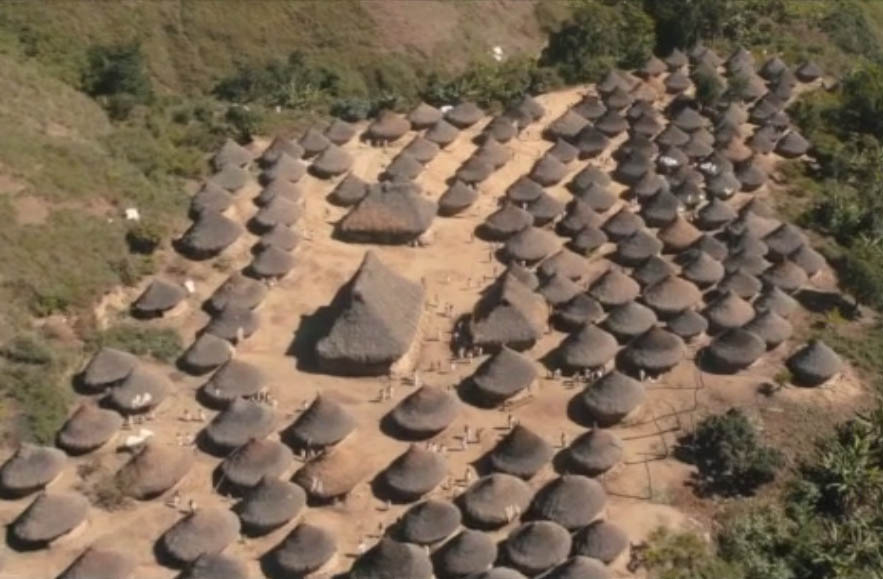
This is what a non-monument building Taironan city looks like. It is occupied periodically as a rendezvous center.
327. At the current rate of change, how long do you believe it will take society to transcend our human nature and stop segregating each-other by pigmentation, appearance, wealth, political beliefs? Will it take a discovery about the nature of reality?
Materially, the current and prior 300 years of change has been one of exponential growth in population and consumption of energy and stuff.
Behaviorally, the prior 300 years of change has been a behavioral sink, a loss of functional behavior. Last year in America, 26% of the population suffered from a clinically diagnoseable mental disorder (mostly untreated). Such will produce and raise the next generation that will tend to be less functional. Repeat this pattern 8 to 12 generations (we are on average about 8 generations into the Industrial Revolution), and social systems become increasingly dysfunctional until they fail.
What it will take to change the condition is the recognition that modern techno-industrial life as we know it is not remotely sustainable, i.e. that it will fail for both material (Malthusian) and behavioral (Calhounian) reasons. If a remnant population repeats the pattern, then there will have been no change. If a few individuals foreseen the dissolution and vote with their feet to form pockets of sustainability that select for increasing functionality, some may succeed such that humanity comes to live viable ecolate (systems science literate) lives, which will involve understanding the planet and learning to live with it properly.
Posterity has three pathways: extinction, repetition of the pattern of overshoot and collapse, or to again become viable subsystems within Nature as our ancestors were for nearly four billion years until they started to live in overcomplex empire building societies about ten thousand years ago, a pattern that became normal (most humans lived in overcomplex societies from chiefdom to state level) about 3–4 thousand years ago, to today, when all but perhaps a few thousand humans don’t live in the first global empire of modern techno-industrial monetary culture all are products of and serve.
In short, we can understand our problematique, find solutionatiques, or die.
Our problematiques are also known as ‘wicked problems’, such as overpopulation, economic growth, and climate change. But the problematique, our meta problem, is overshoot.
The New York Times has mentioned "ecological overshoot" zero times since 1851....
328. What if overpopulation never existed?
What if reindeer had never overpopulated St. Matthew Island, St. Paul, or St. George Islands? Well, each island had a carrying capacity for reindeer when they were introduced to small islands without predators. There was a carrying capacity overshoot event which would not have happened if they were good K-strategists. Thousands of other examples of introduced species give the same answer.
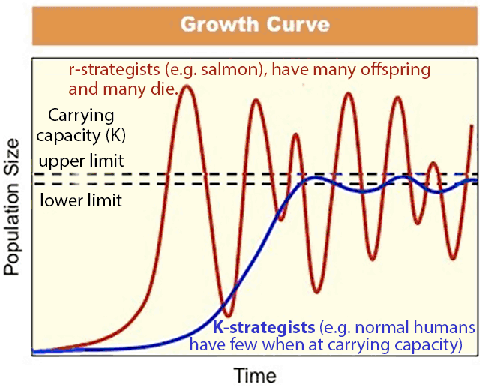 When there is an overpopulation event and on islands, extinction may be the outcome in species not adapted to managing their populations as K-strategists.
When there is an overpopulation event and on islands, extinction may be the outcome in species not adapted to managing their populations as K-strategists.
Polynesian rats, who may be the only mammal living on an island without predators, are sensitive K-strategists. They have only one litter of 1–5 pups during one breeding season each year. Having 4–5 allows for exponential growth such as when they are first introduced to an island by chance or humans brought them. Having 1–2 pups in response to increasing stress allows for degrowth. As good K-strategists, they do not overpopulation their environment. Reindeer and humans are not such good K-strategists (sorry about that).
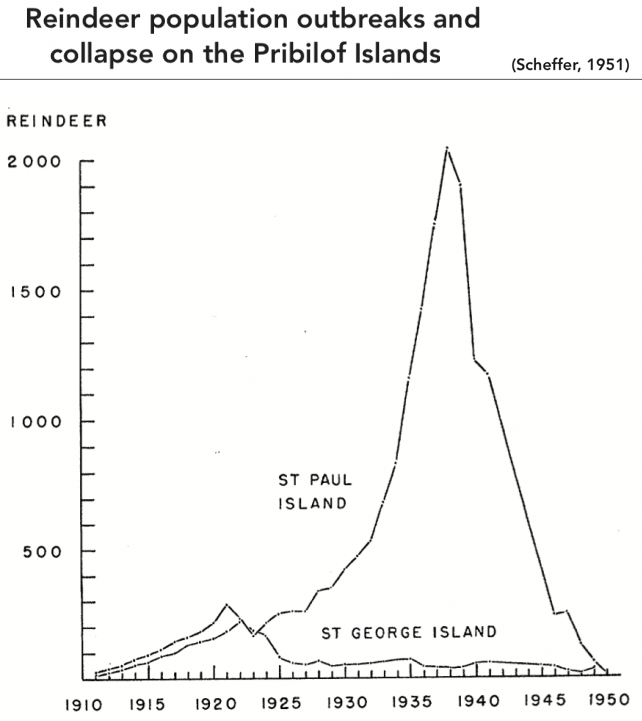
In both cases the population descended to island extinction due to overshoot degradation of carry capacity.
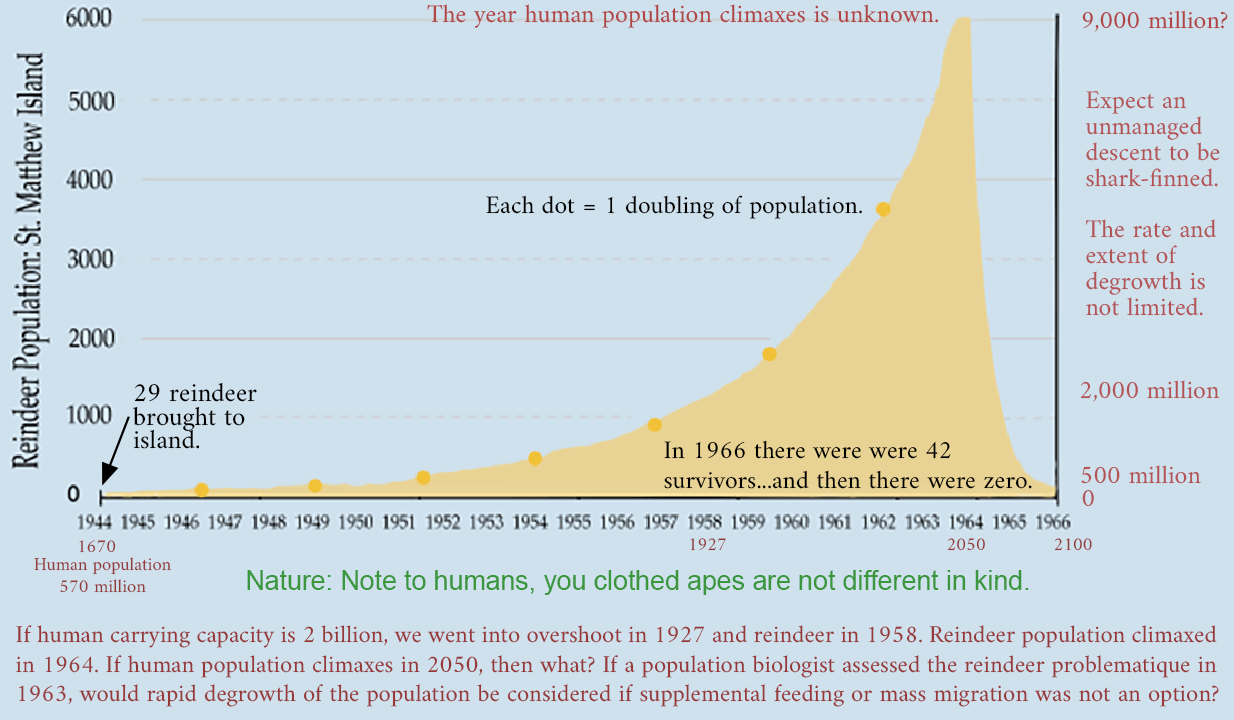
And humans overpulsed on Malta 3500 BCE to 2300 BCE to island extinction.
And on Pitcairn Island prior inhabitants had pulsed to island extinction before the crew of the Bounty resettled the island to grow (for a time) their population at 3.4 percent (doubling ever 21 years).
And on Easter Island:

Regionally, humans have overpulsed their population and consumption thousands of times in the last 10k years from chiefdom to state levels of overcomplex society.

What if humans never overpopulated any area whose environmental productivity they depend on? Humans would still be living as K-strategists within carrying capacity, would not overpulse into one-off plague-phase overshoot events. Our history of the last 10k years would not have happened, nor would the current Anthropocene mass extinction event be happening.
We hubris ones are now, as modern techno-industrialized (MTIed) humans, a global MTIed invasive species empowered by fossil fuels (for a time). Will we climax and descend on Earth Island to planet-wide extinction? Will we adapt and become evolvable again as K-strategists? No one knows. We MTIed ones are energy and posterity blind. Humans are 99.9965% blind; i.e. we can see about 0.0035 percent of the entire electromagnetic spectrum—our grasp of biophysical reality is fragile and our MTI schooling system has failed.
For the first time (and likely the last) we humans of today will determine humanity's future, arguably the best time to be alive and have the potential to influence our outcome: to remain an adaptive, dissipative, non-evolvable MTI structure (that like a hurricane is but for a time), or understand the human predicament and develop a solutionatique that works as Gaia, the system, determines works long term (by listening to Nature who has all the answers). The fork in our road towards persisting as a viable species is to remain a dissipative structure or to again become an evolvable system/species whose K-strategy is determined by memes given that, with technology, the pace of change is too fast for genetic evolution to come up with a solutionatique.
The New York Times has mentioned "ecological overshoot" zero times since 1851....
329. What do you think is the biggest problem in the world right now and why? What solution can we take to that problem?
The biggest problem is the one that all other problems related to our continued existence as a species on this planet follow from, are subproblems of. ‘The problem’ is also known as the meta-problem or problématique. The broad definition of problématique as a term is that it is a problem or question referring to global systemic problems. The term was coined by the Club of Rome, 1970, in "The Predicament of Mankind", so "the human predicament" is used interchangeably. The premise is that all problems that matter to humankind's persistence are interrelated, hence solving completely and forever one or even a dozen problems (e.g. climate change, mass extinction) would not significantly affect the trajectory of modern techno-industrial (MTI) society whose systemic problem, its meta-problem, is overshoot, including but not limited to ecological overshoot (e.g. density, complexity, biological, psychological, civilizational overshoot). Or just overshoot to reference the whole shebang, our problématique.
Subproblems of the global problématique may be called problématiques or wicked problems (e.g. overpopulation, climate change), as their solution (resolutique or solutionatique) depends on solving the meta-problem of overshoot. The New York Times, by the way, has used "ecological overshoot" zero times since 1851, and "climate change" (a politicized distraction from our Anthropocene overshoot event) has been mentioned over 31,000 times (over 12k in last five years, 66 times a week last year). Virtually all humans are ignorant of, unable to think about, the wicked problem (much less its solutionatique) that will end life as they know it (possibly posterity too), and so their proposed solutions (e.g. a Green New Deal, empowering women, a truly free market, a Global Caliphate, true democracy, Green Growth...) to any wicked problem is delusional (based on error, ignorance, and illusion).
Foundational to our inability to understand our problématique, or any wicked subproblem, is that there are no political solutions, i.e. no solution acceptable to the empowered (to any autocrat or We the People), to we Anthropocene enthusiasts all (even if some, like me, are less enthusiastic than others).
This is the “Wittgensteinian fly bottle” we have gotten ourselves into as political animals. Any real solution (e.g. rapid degrowth of our population and per capita consumption, ending the MTI monetary society) is unthinkable other than to those who may live through the coming bottleneck event. Posterity may have a different view, may lament our inability to embrace degrowth with enthusiasm, to 'seek out the condition now that will come anyway' [H.T. Odum].
As Ruben Nelson notes: "The main driver of the problématique is the fact that after almost 1,000 years of nurturing our Modern Techno-Industrial (MTI) form of civilization into being, it is becoming clear that in its present form, now utterly unbuffered by past conditions and habits, our MTI form of civilization, at heart, is lethal to life.... Not good news for 10 year olds."
And the solutionatique? Enough humans understand the above or die (humans, trapped in their MTI fly bottle, go extinct).
330. At which point did humans start hurting the planet more than helping it?
‘Human’ in biology speak is an informal term short for ‘last hominid standing’, which today refers to only one species. There have been many bipedal apes. Now there is one. If after interbreeding with Neanderthals, Denisovans, and two or more as yet unnamed species of hominid, we displaced the others whether by outcompeting them or directly by killing them as an invasive species, then that would qualify as harm. Objectively, invasive species cause harm to biomes that may take millennia to tens of millions of years to repair as the harm often includes the extinction of other species.
Modern humans left Africa about 60,000 to 50,000 BP. A single group of humans crossed the Red Sea to disperse globally as an invasive species, with some returning to Africa, becoming the ancestors of all non Africans other than such Neanderthals, Denisovans, and as yet unidentified humans as they interbred with and displaced. One group rapidly crossed southern Asia to New Guinea and Australia. Others traveled north to Eurasia via the Middle East about 45,000 BP, spreading throughout Western Europe as hunter-gathers (WEH) about 43,000 BP.
The initial spread of humans about the globe caused harm, but perhaps little or no irreversible harm such as is caused by species extinction. To cause real harm requires technology. Lithic technology evolved over millions of years in Africa and may have caused no megafauna (<100kg) extinctions as the hunted had time to coevolve with human hunters. But when humans left Africa, megafauna extinctions followed. Causation or correlation? No one knows for sure, i.e. some humans still seek to avoid believing their ancestors could cause species extinction even though the rate of anthropogenic species extinction is now over 1,000 times baseline, heading towards 10,000 times higher by the end of this century. Humans exceeded carrying capacity when the population of our Anthropocene enthusiast ancestors (regionally causing megafauna extinctions on five continents) exceeded a few million. We moderns, evidently, are far more enthusiastic now than they were.
As the glaciers retreated 19,000 to 14,000 years ago, a new wave of human migrants spread into Europe, and about 9,000 years ago, farmers from northwestern Anatolia moved in to spread, interbreed with and displace the hunter-gatherers. The third major migration began about 5,000 years ago when Indo-European herders swept in from the steppe north of the Black Sea in what is now Russia. Those Yamnaya pastoralists herded cattle and sheep, and some rode newly domesticated horses. Unlike the hunter-gatherers and agrarians, they were patriarchal and celebrated conquest which their livestock (especially horses) enabled. Little or no male hunter-gatherer/agrarian DNA survived, achieved by killing all males and breeding the women who persisted among the agrarians though their language and culture was largely replaced by the Indo-European invaders. Joseph Campbell found evidence of a goddess culture in the fragments of pre-Indo-European mythology. Descendants of the original populations served their overlords as a peasant, serf, commoner, or slave class (prey-like population to elite predator-like population). Prior to this, the Indo-European culture was not the norm as it is today worldwide.
For 300k years our Homo sapiens ancestors were hunter-gatherers. Everywhere hunter-gatherers and agrarian peoples have lived side by side they viewed each other as not truly human. From the POV of 99% of our ancestors, agrarian expansionists always cause more harm than good (unlike true humans). And from the POV of all other life on Earth, with the possible exception of livestock, pets, and crop species, humans started doing more harm than good about 3k-4k years ago when most where building agro-empowered complex societies (empires from chiefdom to state level).

Basically, the question is, when did the Anthropocene mass extinction event begin? Regionally, Homo erectus’ use of fire to alter biomes caused more harm than good regionally. The use of force-multiplier technology (e.g. atlatl and Clovis points) to cause megafauna extinctions is harm balanced by no known good. But the spread of agriculture, including animal, and agrarian/pastoralist culture, which had become pervasive by 3k to 4k years ago, should be seen as the clear tipping point when humans began to cause more harm than good.
Of course, true Anthropocene enthusiasts will have a different view, i.e. that the good we do is still vastly greater than any alleged harm misattributed to Lord Man by eco-fascist misanthropes.
Most scientists today are in deep denial that we modern techno-industrialized humans are well into a one-off plague-phase overshoot event. Other Anthropocene enthusiasts are in greater denial.
To simplify our predicament, we are like the 515,000 people living on the three islands of Malta that has an environmental carrying capacity (without significant imports) of maybe 800 people given that to live on the islands long term (as the millennia pass) room must be left for Nature who provides all services that allow for the persistence of life on on Malta (and on Earth Island). This is not a belief-based claim based on political or religious certitude. It is what Nature says to those who listen. Those who don’t listen go extinct. Could humans living on Malta (or Earth) ever live as one? Perhaps, but not as MTI humans, e.g. The Malta Solution.
"There have been seven [climate change] disasters since humans came on the earth, very similar to the one that's just about to happen. I think these events keep separating the wheat from the chaff. And eventually we'll have a human on the planet that really does understand it and can live with it properly. That's the source of my optimism." James Lovelock who envisions an 80% to 90% die-off event this century.
What might a viable alternative to MTI society look like? Nation-states replaced by 25k watershed management units that are members of a United Federation of Watersheds, within which humans manage one fifth of the area to support themselves as hunter-gatherers or low-intensity forager-farmers. On average, the population of humans is a few thousand normally living in small communities of 20 to 50 others, but meeting in a central area (monthly to annually) for a time. All would agree to defend any other watershed that might be attacked, and to engage only in sustainable trade between watershed management units.
Optimistically, there could be 25k planets bearing viable civilizations (unlike ours is currently) in the Milky Way. If travel between them was possible, and even one became (or already was) an empire builder (like MTI culture is), then the existence of one sovereign planet able to conquer another would become a state of war that would lead to a Borg-like collective, or all members of the Federation would agree to destroy the independent sovereign planet (or at least enforce its permanent containment, i.e. inability to grow by conquest). Will your descendants be Federation or Borg or go extinct in a few centuries? Near-term developments in this century may determine humanity’s outcome. The time to stand and deliver is now.
Spinoza realized that to understand something (e.g. overshoot) is to be delivered from it. If humans understood the exponential function, i.e. that growth is for a time (becoming increasingly detrimental as the lower limit of environmental carrying capacity is exceeded), then our enthusiasm for growth would be moderated. And if we understood that technology enables us to exploit a planetary larder of energy and resources (dismantle a global life-support system), then our enthusiasm for technology (e.g. cars) would be moderated. To understand is to stand down from our hubris heights. As Ludwig Wittgenstein put our options in fewer words, “Understand or die.”
The New York Times has mentioned "ecological overshoot" zero times since 1851....
331. What are the positive and negative effects of a hairless bipedal ape species becoming dominant on earth? What are the good and bad changes they have made to the earth?
Thanks to technology, when we left Africa 50–60k years ago, we caused megafauna extinctions on five continents, not to mention many islands like Zealandia, Madagascar, and Malta. With agriculture we’ve converted most arable lands into cropland, pasture, forests into tree farms and rangeland needed to support megacities and lessor cities most people now live in. We came to live in complex societies supported by slaves (including, wage and energy slaves). We’ve convinced billions of people to follow organized religion and identify with political super-tribes to make for ongoing conflict to ensure competitive growth.
By getting almost all humans to view themselves as citizens of a nation-state, we created a condition of independent sovereign powers that IS WAR and of independent sovereign individuals that IS CONFLICT. We are presiding over the greatest mass extinction event since the late Cretaceous, one that could rival that of the Permian. We have become LORD MAN.
 There have been no negative effects. We will soon go fourth to subdue the galaxy and then beyond to fill the universe with wonder.
There have been no negative effects. We will soon go fourth to subdue the galaxy and then beyond to fill the universe with wonder.
332. What is the principle issue of humanity?
As the t-shirt has it, “There are always issues.” Anyone over thirty has learned this, likely the hard way. So the principle issue is the meta-problem of humanity which defines the not remotely sustainable condition we all live in, aka modern techno-industrial (MTI) monetary culture/society. We are alleged sovereign individuals who serve the economic/socio-political system of growth and development (sustainable, of course, since 1987).
The schooling systems (aka the education system) has been cranking out schools of sustainability graduates since 2006 even though doing so decreases MTI sustainability by obfuscating our meta-problem, our problematique that is composed of multiple problematiques, aka wicked problems (e.g. overpopulation, pollution, mass extinction, climate change), which all products of the modern education system (who have been successfully schooled) are unable to think about, let alone consider any wicked solutions or the solutionatique that would alone address our problematique (overshoot).
We who have been living on the upslope for the last 300 years deeply believe that we can keep on keeping on ever upward, that we will construct a Dyson sphere to turn all the sun’s energy into humans, livestock, pets, crops and stuff. Then we’ll do the same for all stars in our (it belongs to us) galaxy before spreading to trillions of other galaxies. But Nature doesn’t care what we believe.
We MTI ones are a one-off, plague-phase, fossil-fueled overshoot event that will create a distinct geological layer containing radioactive elements and microplastics. Will any humans learn to understand the planet and live with it properly (long term as the millennia pass)? Systems science illiterates can’t ask the question and of those who can, only a fraction of a percent do (and consider real solutions) without being paid to (or with even the approval of anyone they know).
Collectively we can do nothing to foundationally change the MTI system we are products of and serve. We all live in an Omelas-like society, but one that is not remotely sustainable, that selects for its own failure, Some may walk away from Omelas, but they are few and so must walk away alone. They may have heard rumors of others walking away, perhaps in what direction, but to walk away is to embrace the unknown and forgo the known. Only understanding that Omelas is a pathological condition that selects for dysfunction can enable one to walk away choicelessly. Most think they have a choice to stay, and so will. Only choiceless awareness allows one to do the hard thing.
Understanding that humans are not different in kind from other organisms, and that the second law of thermodynamics applies to us, as do carrying capacity limits and the outcome of ecological overshoot, is lacking. “Understand or die.” [Ludwig Wittgenstein].
To simplify our predicament, we are like the 515,000 people living on the three islands of Malta that has an environmental carrying capacity (without significant imports) of maybe 800 people....
333. Do you believe that humanity is like a disease infecting planet Earth?
What I believe or disbelieve, like or dislike, is of no matter to the Universe (Nature), and so of no interest to me. Is there objective evidence and reason that humans are a pathological/dysfunctional lifeform? How would Klaatu answer the question?
Our ancestors, going back nearly four billion years, were functional, evolvable subsystems of Gaia. Those that were not didn’t become ancestors. Does any modern educated human think we humans are by nature mere animals? I have never known of nor met anyone who thinks so. Like all modern techno-industrialized (MTIed) humans, I think we MTIed ones are different in kind from all other organisms, i.e. that we are no longer complex, adaptive, evolvable systems, but are now exceptionally complex, adaptive, dissipative structures as independent sovereign powers at the individual to state level. We have become a foundationally abnormal, pathological, non-evolving dissipative structure that selects for its own failure (termination) and that of a planetary life-support system.
Are there still any remaining non-MTIed humans on the planet? Possibly, but if I or any MTIed human knew of them, many would seek to assimilate them so they ceased to be outside the collective of our now global monetary culture. I am an Anthropocene enthusiast, just not as enthusiastic as most. I know what money is, value it, even have some. I serve the socio-political economic system we think we are lords of.
I differ in that I would rather know than believe, but I am not different in kind. I too am a pathogen,, one that would rather know then myself than believe that Lord Man is a paragon of animals. Behold our works ye mighty and despair: LORD MAN ON HIGH.
I have of late, (but wherefore I know not) lost all my mirth, forgone all custom of exercises; and indeed, it goes so heavily with my disposition; that this goodly frame the earth, seems to me a sterile promontory; this most excellent canopy the air, look you, this brave o'er hanging firmament, this majestical roof, fretted with golden fire: why, it appeareth no other thing to me, than a foul and pestilent congregation of vapours. What a piece of work is man, How noble in reason, how infinite in faculty, In form and moving how express and admirable, In action how like an Angel, In apprehension how like a god, The beauty of the world, The paragon of animals. [From several editions this speech was altered/edited, and even in context misread by millions and quoted out of context to the thrill of Anthropocene enthusiasts everywhere who cannot think badly of themselves. Hamlet is being sardonic and in modern times might have ended with a dramatic pause followed by 'NOT!'] And yet to me, what is this quintessence of dust? Man delights not me; no, nor Woman neither; though by your smiling you seem to say so. [Having myself overlooked the context, I too read the (boldface added) lines, easily quoted from memory, as celebrating human exceptionalism.]
Look about you. What do you see in front of your face? Survey all of history. What says history? We are such stuff as empire is made of. Even the Chinese have been Indo-Europeanized, MTIed, and seek to grow their economy evermore. The plainest fact is that our MTI way of life is not remotely sustainable and that all deeply believe it is. We will deny, deny, deny until the last syllable of unrecorded breath is uttered. We will not evolve. We are not mere animals.
We are in one-off plague-phase overshoot and we will keep on keeping on until we can’t. When the last MTIed human dies (did I mention non-evolvable?), will they be the last human on the planet (or off)? Likely, but I don’t know and neither do you. Perhaps someday there will be a human who really does understand the planet and can live with it properly (to thereby persist).
To simplify our predicament, we are like the 515,000 people living on the three islands of Malta....
334. Is there hope for humanity on this planet?
The big question, after realizing that humanity has a problem (sort of like the astronauts on Apollo 13 had, but more complex), one that is an existential threat to our continuance as a species (and other species via Anthropocene mass extinction event), is: ‘Is there any hope for posterity?’ Only a modern human could think it is all about them surviving to enjoy their wealth
The human predicament, our problematique or meta-problem is our hope, the best thing that ever happened to humanity IF we can understand it. Our problematiques are also called wicked problems (e.g. our behavioral sink/loss of functional behavior typically over 8 to 12 generations of overdensity living (e.g. urban dwelling), our condition of carrying capacity overshoot, the mass extinction event we (our overshoot event) are the cause of…, on down to lesser problematiques like climate change, microplastic pollution, declining sperm count…).
None of our problems can be solved separately because all are interrelated, all are one problematique to which there can be one solutionatique (our hope that depends on understanding our predicament, the one that growth and development has gotten us into). There are perhaps many potential solutionatiques, but only one can be realized in our one-off timeline. One will work or we go extinct, whether extinction takes a century, a millennia, or an eon (the ending of the Anthropocene whether in some decades or millennia).
Our problematique, to state it in three words, comes from Ludwig Wittgenstein: ‘Understand or die.’ The solutionatique (our hope), in 11 words, comes from Baruch Spinoza: To understand something is to be delivered from it. If you can choose to not understand, then you will choose to not understand (and die).
Oh, but they are both saying the same thing…, which is not surprising if their insight is true to the nature of things. Words are not true, out there, but may point to the what-is that is (out there), that does not go away if we don’t believe in it.
For nearly four billion years our ancestors had one hope: to become ancestors and some did. Could some humans (modern techno-industrialized Homo sapiens) become ancestors? Perhaps, but realize that ‘some’ may mean 0.0001% of modern techno-industrial (MTI) humans may come to understand the planet and learn to live with it properly (i.e. become non-MTIed recovering humans).
Our hope is that some do and come to prevail numerically over those who do not (e.g. takers/marauders), those who see the planet as a resource for the taking, those who are energy and posterity blind (as those who may come to persist cannot be).
Understand that our predicament is a one-off overshoot dynamic of exceeding limits having the dissolution of our MTI society as outcome (if not extinction which could be viewed as worse). Our growth hegemon (not remotely sustainable) will climax and descend/collapse. Over 8 billion humans will pass through a bottleneck event (die-off). The unknown is what sort of human will be selected for (and against), and how many?
And then what? Will humans on the downslope, over perhaps 8 to 12 generations, reacquire functional behaviors or, as they did on the upslope, will they add to their loss of functional behaviors, the ones that their ancestors possessed for 300k years, that allowed them to live as K-strategists within Nature’s limits?
Well, the short answer is that some humans will again understand their place (stand down from our hubris heights) as subsystems of Gaia or go extinct (i.e. understand or die). If some come to again understand their place, to again become people of place, then in that understanding change becomes possible (e.g. those who walk away from Omelas/MTI society) as it will be choiceless. Our hope is choiceless awareness/understanding that comes from listening to Nature who has all the answers (and not to the prattle of voices in your head or the heads of other humans). ‘To think is to listen. Listen.’
To listen is to learn. If someday there'll be a human on the planet that really does understand it and can live with it properly, then that is our best and only hope, that is the basis for optimism/hope. Could there be humans with technology on the planet in the future as the millennia pass?
No one knows enough to have an opinion. The few who understand this and stand down from their hubris heights may be among those who persist as patterns in the form of their descendants (genetic and memetic) who persist. Understand or die, hu-mans.
If anyone can choose, they will keep on keeping on pursuing short-term self interest until they can’t by believing what they want to. The believing mind is a fatal codisorder. Our wicked problems may require wicked solutions to avoid our dissolution as a dissipative MTI structure (by again becoming an evolvable subsystem of Gaia).
Understand that the bifurcation cometh. Humanity will enter the coming bottleneck and 8 to 11 billion people will not pass through it. A better, more hopeful (reality-based) view is that 7 to 35 million people (as posterity living prosperous enough lives) come to live in a viable society whose ‘rules of the game’ select for increasingly functional human behaviors. They thereby come to live properly with the planet (Gaia).
Viable humans who vote with their feet may give rise to a viable civilization. Non-viable takers (e.g. Late Bronze Age collapse Sea Peoples and Land Peoples) select for self-extinction. We will understand (or not) our overshoot condition, our wicked problem, to thereby be able to consider possible solutionatiques that might work as Nature alone determines what works. The secret awaits for the insight.

We MTIed ones consider living in our one-off plague-phase overshoot event (during the ongoing growth phase) to be normal. We think growth without limits is the best thing ever. We are right, but only FOR A TIME on the upslope. We MTI ones lack foresight intelligence because our monetary culture selects for short-termism. Sorry about that....
335. When did humanity give up with the concept of "waste not, want not"?
About 90 years ago everybody knew:
Use it up. [i.e. every bit of flour in the bag to waste none.]
Wear it out. [Wear clothes until you can’t mend them anymore.]
Make it do. [Having a pot to pee in is better than no pot.]
Or do without. [Tighten your belt a bit and work harder in the garden.]
This was before the consumer society which kicked in about 80 years ago with exponential growth fueled by a planetary larder of fossil fuels [for a time]. The next Greater Depression will be different. There will be no planetary larder of fossil fuels to grow the economy. Not good news for ten year olds.
336. Why are we so desperate to destroy Earth?
We humans, as hunter-gatherer K-strategists, lived within limits for 300k years without destroying a planetary life-support system. Our population was less than 10 million. But ‘we’ are not hunter-gatherers, but modern techno-industrial hunters and gatherers of energy and resources to consume who look about and see a planet for the taking, and having technology, we endeavor to take what can be.
Sometimes for hundreds of years, even for over ten hundred years, agriculture has empowered humans to expand and conquer, to build empires regionally about the planet, none of whom have been sustainable. All expanded and took for a time, climaxed and weakened to either descend to self-extinction if in isolation (e.g. Malta and Indus Valley Civilization), or be conquered by nearby upstart empire builders.
For the first time, empowered by fossil fuels, humans have pulsed globally into overshoot. We are, for a time, empowered by a planetary larder of fossil fuels that provide each human with hundreds or thousands of energy slaves. The dynamic thus created, which all of us are products of and serve, is what is driving the Anthropocene mass extinction event that may come to include humanity.
Objectively, what we modern techno-industrialized humans are doing looks like a rapacious intent to destroy the biosphere because that is the outcome of our pursuit of short-term self interests that modernity selects for.
We are pulsing into overshoot, having climax and collapse as outcome, because we are techno-industrially empowered hunter-gatherer hominids who no longer live on an African savanna. We clever apes have so far proven to be too clever by half and not nearly smart enough to have technology and not be had by it. Whether we learn to understand the planet and live properly with it, posterity (in the near future) will likely find out. Not good news for 10 year olds.
337. How can humanity quickly "turn things around" and somehow get a major movement going, where pretty much ALL groups join in and overturn all this war, rampant, greedy Capitalism, etc.?
Rapid change (in geological time) would involve a genetic or memetic bottleneck through which only a few humans pass. Assume 100 humans (or 10k) pass through a population bottleneck, a filter. All are peace-loving, cooperative, non-rapacious humans who actually live a different life as their parents also had. Assume their offspring, almost all of them, live loving lives (the few who don’t do not have offspring), then humanity would quickly change.
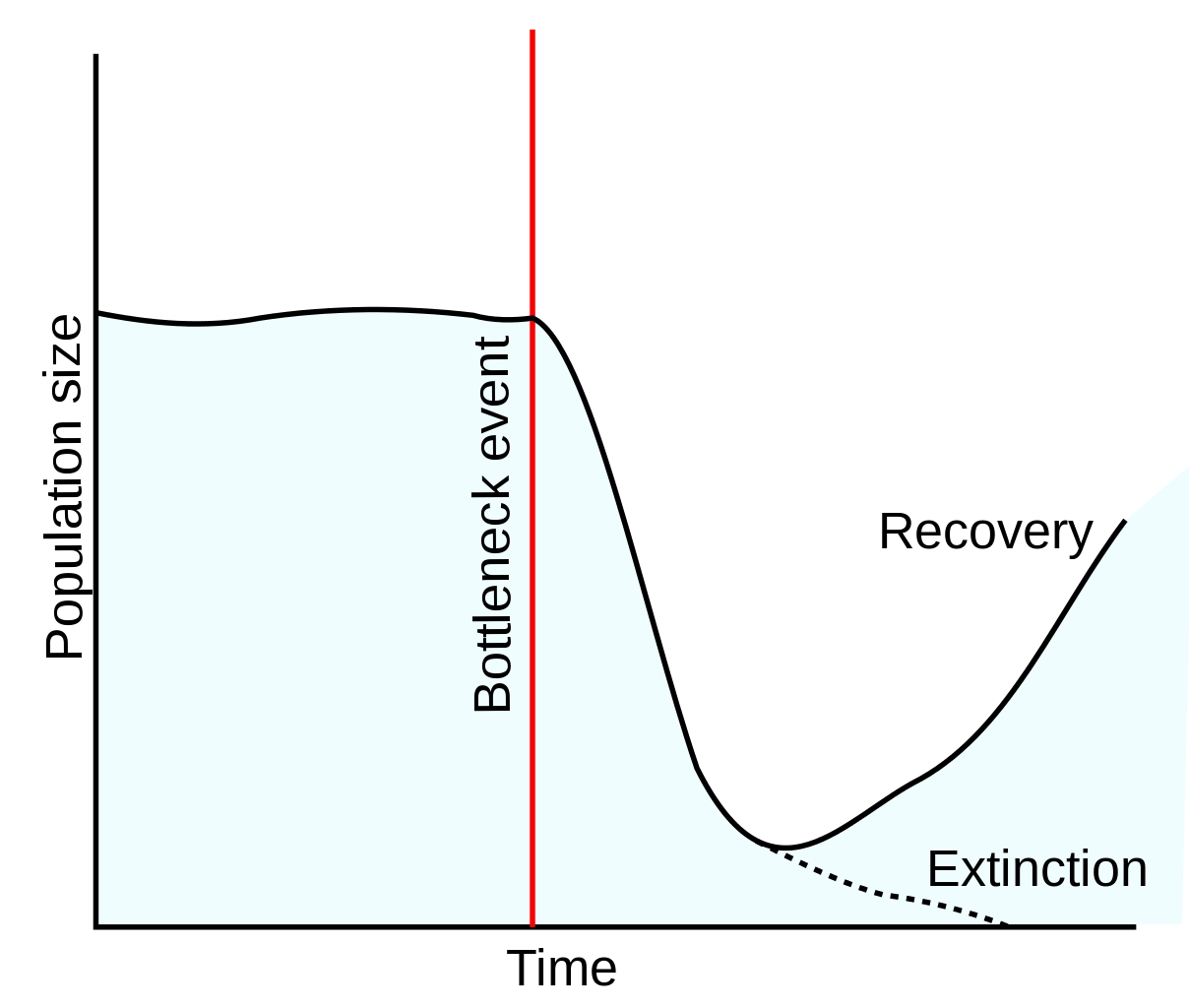
The first humans to spread throughout the Americas may have all descended from a group of 70 who made it across the Bering Strait. Two million years ago a small group of Australopithecina changed as they transitioned into the species known as Homo erectus who were different and spread to become our ancestors.
https://en.wikipedia.org/wiki/Population_bottleneck#HumansSomething similar may have happened about 50k to 60k years ago when a small group of humans left Africa across the Horn of Africa to spread east throughout Asia to Australia, and north into Europe to displace other Homo sapiens and other subspecies of archaic humans. This group became ancestors of all non-African humans and those who as agriculturalists returned to African in the Neolithic. They may have been different in some behavioral way that does not show up in the fossil record, e.g. they were more matrilineal, more cooperative, could have been able to live in larger groups, and had a competitive advantage.
https://www.ncbi.nlm.nih.gov/pmc/articles/PMC2427203/A similar rapid change occurred about 5200 BCE (7150 BP): The Indo-European expansion of language and culture that selects for empire-building spread in several stages from the Pontic steppes into western Europe, central Asia and India. This process started with the introduction of cattle at the Eurasian steppes, which led to the rise of a new culture, to a kind of cowboy culture. Between 5000 and 2000 BCE, they spread-out with their cattle and horses over the Pontic steppes, and outside into Europe and Asia. Use of force was involved in displacing hunter-gatherers, but the expansion was based on cattle as the basis of the economic system that empowered them. Much as plant-based agriculture supported empires in Mesopotamia, Egypt, India, China, coastal Andes, and Mesoamerica, animal-based agriculture supported the spread of the Indo-Europeans. The first Indo-European speakers to build empire based on military force are the Hittites who had spread into central Turkey fighting with chariots and iron weapons. Linguistics has allowed the reliable reconstruction of a large number of words relating to kinship relations. These all agree in exhibiting a patriarchal, patrilocal and patrilineal social fabric that opposes the Paleolithic hunter-gatherer and Early and Middle Neolithic egalitarian norms. In patriarchies women are exogamous, joining their husband's (their overlord's) family. The mythology focuses on supreme beings, on really Big Gods with strongly alpha male natures who are intolerant of matriarchal narratives. Empire-building favors patriarchal values and the conquered become patriarchal. Wanting to be an alpha male is a biological atavism as is the capacity to fear and submit to alpha male elites, real or imagined, that goes with empire-building.
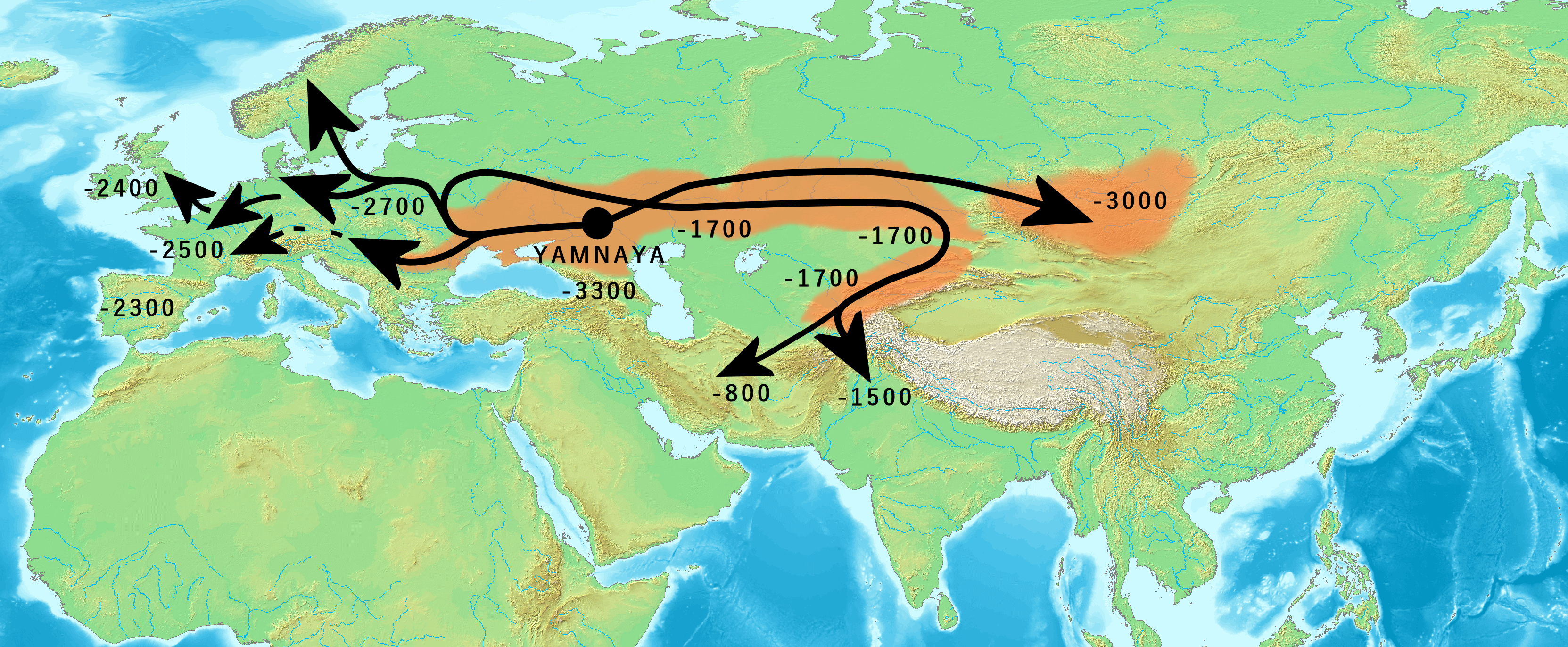
All variant modern techno-industrial human monetary cultures spread with them. Members of the CCP are now as enthusiastic about the Anthropocene (e.g. about war and making money) as Europeans and Americans. The language of China is not Indo-European, but the culture now is. The people of Ukraine are Indo-Europeans who displaced (or conquered) the prior matrilineal humans who lived there as are the Russians who are now conquering them.
In ancient times the displacement typically involved killing the males, breeding the young enough female population, and forced adoption of Indo-European language/culture. Modern humans don’t like such stories, but that’s what the genes and memes are telling us. Moderns are more civilized as they don't have to impose their language and culture on those who already share it.
https://en.wikipedia.org/wiki/Archaeogeneticshttps://en.wikipedia.org/wiki/Early_European_Farmers#:~:text=In%20archaeogenetics%2C%20the%20terms%20Early,early%20Neolithic%20farmers%20of%20Europe.Short bottleneck events may be caused by catastrophes, e.g. die-off events, while long bottleneck events involve competitive displacement whether by peaceful conversion/assimilation or genocide (or both typically alternate together).
So the good news is that relatively rapid change is possible, but only by displacing existing groups. Doing so memetically works. In recent times, religious ideology has been able to rapidly spread, e.g. Christianity and Islam. Political ideology has been able to rapidly spread within modern monetary culture, e.g. democracy, Capitalism and Communism by whatever name. Read Eric Hoffer’s ‘The True Believer’ and note that mass movements never achieve their intended/stated/envisioned outcome, though some do have the outcome of rapid change.
Careful what you wish for. Imagine a future with practically perfect humans in it. Imagine you succeed in starting a mass movement demanding the realization of your vision NOW! Image the opposite outcome, as usual.
338. What will be the future of the human species?
Using the word ‘will’ is a call for certitude, which humans want but can’t have. We cannot know our future in any details, but if we are currently on a path, a trajectory, then something may be said of our possible futures, of what MAY be the future of humankind in broad terms.
Go out everyday at noon and shoot an arrow at the sun. Can you say exactly where it will land? Every time it follows an upslope trajectory, its height grows, for a time. You repeat the experiment everyday for some years. So far it has always climaxed, reached a high point, transitioned to descent and falls back to earth along a downslope path. All prior empires have followed this trajectory. Will the one you live in, the now global one we all live in and serve, climax and descend?
Can you be certain that as it climaxes, an eagle won’t grab the arrow and fly off? No, but you can envision that at some point the eagle will drop the arrow or descend to earth with it, i.e. that it will come down. Perhaps it will fall into a river, flow out to sea, become waterlogged and sink to the depths to be encased in sediment, fossilize, and be uplifted as part of a mountain. But eventually it will erode and descend. There are limits to growth.
Humans differ from arrows in that our path and future will be more complex. We were once an evolvable subsystem of Nature in various hominid forms on back to the first life on earth, but as modern techno-industrialized humans we have become an overcomplex, non-evolvable system, a dissipative structure that selects for its own failure, just as hurricanes always dissipate and never evolve into new forms.
We have reached great hubris heights from which we will fall. Don’t know when, don’t know how far. To extinction? Or will we reform as a viable, evolvable complex system? Posterity only knows. There may be a last human who can foresee that with their death will be the end of the human experiment in living. Or a viable civilization may arise and after a few millennia may be in a position to foresee their continuance, their persistence as adaptive and evolvable humanity.

Ludwig Wittgenstein summed up our possible futures in three words: “Understand or die.” We may understand the planet and learn to live with it as adaptive, evolvable subsystems, as our pre-modern, pre-Neolithic ancestors did. Maybe we can learn to have agriculture and technology without being had by it, destroyed by it (after prospering greatly for a time).
I don’t know if humans will come to love this planet, understand it, and learn to live with it properly, but I have a preference. I prefer to listen to Nature, who has all the answers, rather than to the voices in my head or the voices in the heads of others, whether considered great religious, political, philosophical, scientific, spiritual, or thought leaders. I do listen to those who endeavor to listen to Nature, but I never believe anything they say. Instead, I listen for the ring of truth, as Philip Morrison did.
Humans can prattle on, for a time, and die in their belief-based certitudes. Or if we can listen and stand down from our hubris heights, we may persist. We cannot choose to stand down, but seeing (understanding) that the outcome of not doing so is death, we will be humbled involuntarily, which is the condition that will come anyway, if only to the last human on earth who foresees the end of our dissipative path. If we persist, we will have listened because we must to have persisted. If we can choose to follow our short-term self interests, then we will. We can love and understand Gaia, or die. Those who walk away from Omelas cannot choose to do otherwise.

339. If humanity lasted another 10-20,000 years, learned to traverse the stars, could study exoplanets in minute detail and we found not even a microbe of alien life - what would that mean for the nature of our existence?
Humans may last 20k years, but only by living within limits, by obeying the laws of the universe. We will not travel far from Mother. If we do, we will cease to be human. If modern techno-industrial society manages to expand, to keep on keeping on, we will view the Milky Way as a galaxy for the taking. We will become Borg.

If we send out probes to explore the galaxy, lacking even the capacity to harm life should they find it, yet they find none, they might yet detect the existence of prior life on many planets as fossils or ruins and artifacts.
Assume many solar systems have planets or moons and that on one or more, abundant life had arisen. Then a species able to develop and use technology arose, as evidenced by expanses of ruins and artifacts (and a geological layer containing radioactive elements and microplastics) whose era ended all live on the planet. This would mean that humans really are exceptional.
It would also mean that all evidence indicating that we are would-be Borg in the making is wrong. Could we come to love and understand the cosmos and live properly with it, despite all evidence to the contrary? Yes (but don’t count on it).
340. Humanity is being forced to purge or die. Who would you purge, and why?
To get rid of someone or something, as in a group of people who are non-viable and a threat to the continuance of humanity on the planet, could involve a purge that would include all Anthropocene enthusiasts, all who are products of and serve modern techno-industrial society. We cannot purge ourselves. But some could come to understand and thereby be delivered from our condition, from ourselves.

Our tribal social brains naturally think in terms of blame and justification. And by toddlerhood we all learn to deny, to proclaim, “I didn’t do it!” “Not me!” “He did it!”
Actually we started building empires 10k years ago and living by taking rapaciously because, having technology (and thereby being had by it), we can look about, see a planet for the taking, and take it (for a time). We are now, for the first time, in a global one-off plague-phase overshoot event that is having the mass extinction of life on Earth as outcome, an event that may well come to include us. We can, as Ludwig Wittgenstein simplified for us, “Understand or die.” Perhaps some few of us could purge our minds of error, ignorance, and illusion.
Will some humans come to understand the planet and learn to live with it properly (as part of the biosphere and not as a cancer on Gaia)? The next few decades, centuries, or millennia may reveal. We have used a planetary larder of fossil fuels and resources to build ruins and some have acquired some understanding of our predicament. Will enough humans come to listen to those who endeavor to listen to Nature who has all the answers to questions of our persistence worth asking? No one knows.
We modern techno-industrialized (MTIed) ones consider living in a one-off plague-phase overshoot event to be normal....
341. Is technology making us less human? What are the disadvantages?
The implied question is are we moderns becoming less functional humans, less able to persist as the millennia pass? Is technology involved in turning us into Borg? Is becoming Borg-like rapacious expansionists, would-be masters of the universe and space cowboys, an advantage or disadvantage?

Is modern techno-industrial society becoming more Federation-like or Borg-like? Do we view the Earth as a planet for the taking? The first of billions to come? Is doing 11 to 13 hours a day of screen time an advantage? Let’s do 14 to 16 hours… what could go wrong with that?
Well, for the last 10k years, human expansionists and empire builders have been doing their thing. See history. Or as a modern Anthropocene enthusiast, believe what you want to and do what you want to (for a time). If your species’ (posterity’s) extinction is the outcome, then the answer is that living in overdensity techno-industrialized overcomplex societies is a disadvantage that Nature selects against, hence the answer to Fermi’s paradox. There ae no hyper-intelligent pan-dimensional beings in the universe smart enough to understand the exponential function.
342. Would anyone have an idea as to what the world would be like if competent, intelligent and humanitarian people were in power?
No modern techno-industrialized human would or could have knowledge of what it might be like to live in a band of sisters living mostly in balance within a natural world as most of our ancestors did for the last 300k years, except for those increasing numbers living in overcomplex, overdensity societies that have emerged over the last 10k years.
http://www.sustainable.soltechdesigns.com/human-past.htmlWe who think we are the most competent, intelligent, and humanitarian people who have ever lived on the planet, i.e. who are at the pentacle of human achievement (ever flown in an areophane? Driven a car? Read a book? Played a video game? Sat in an air conditioned home?) are the dominant form of life on the planet.

And we are supremacists, FOR A TIME as we blow through a planetary larder of fossil fuels. Look upon our works ye mighties and despair.
http://www.sustainable.soltechdesigns.com/images/over/index.html
343. Is the human race just the worst of the worst invasive species--think cockroaches, English ivy, blackberries, kudzu--is that what we are to the earth?
Humans went out of Africa 50–60 thousand years ago as an invasive species to cause megafauna extinctions of five continents (or six if you count Zealandia), not to mention numerous islands (e.g. Madagascar). Keystone species, such as beaver, increase biodiversity. Humans are the keystone species in urban ecosystems and agroecosystems where their presence greatly increases the populations of rats, crops, cockroaches, livestock, pets, lice… though compared to the ecosystem they displace, urban ecosystems and agroecosystems are typically vastly less biodiverse (except perhaps in some irrigated desert areas).
Whether such is all we are is not clear. It is possible that “someday there will be a human on the planet who actually understands it and can live with it properly” [James Lovelock]. If we just keep on keeping on, then we won’t persist. We are well into ecological overshoot, and our global system of modern techno-industrial growth will climax and descend, but envisioning a viable ecological civilization and transitioning to it would not violate any laws of the universe.
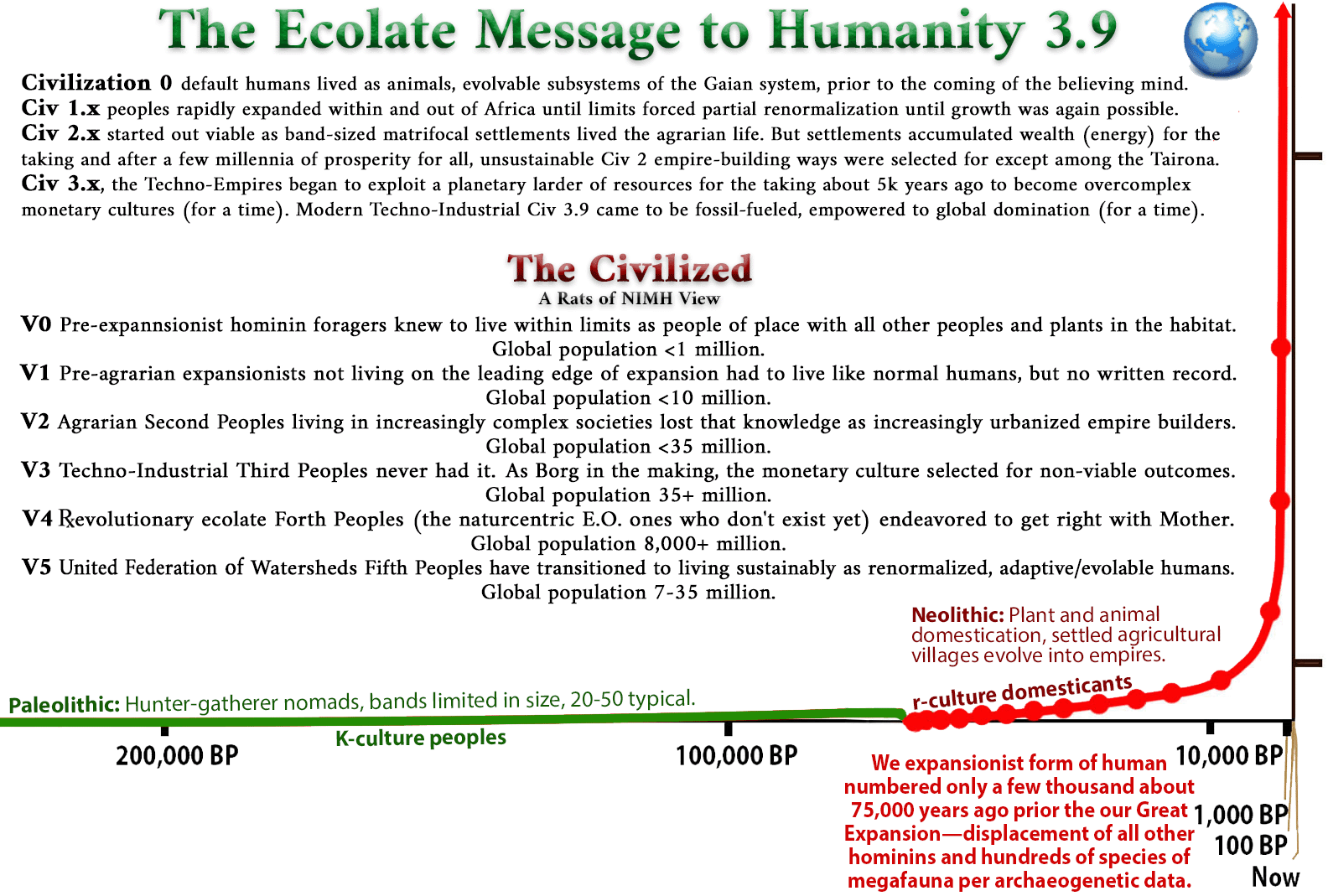
[The early ecolate came to be called the 'E.O. ones', mindless followers of the ecofascist anti-human E.O. Wilson who advocated for merely a Half Earth for humanity. The EOs came to accept the term but translated it as 'ecolate ones'.
Civ 4.x would be transitional, likely taking 8-20 generations by following the prime directive: each generation must objectively become more functional than the last to become Civ 5.0 containing humans who can understand the planet and live with it properly (to persist). It's been a long way up as it will be down, see full graph.]
------------------------------------
Note: Quora removed this answer before anyone saw it. I see it as an answer, but if I log out, it goes away, i.e. no one can see it unless they go to my profile. There was no repetition, so my conjecture that repeated content was triggering such removal is disconfirmed. The number of views before removal varies, so I'll guess human agency is involved. Four of five answers also viewed modern humans as an invasive species, so no idea what I could be saying that a moderator would have an issue with. I did use 'crack whore' in a sentence recently and the post was deleted explicitely with notification, but without any indication of why. My guess is that 'whore' is a disallowed word no matter the context, which AI could detect and remove, but hiding answers from everyone except myself is a new deception. My only guess is that as humans who leave Africa are Africans, calling them an invasive species is obviously racist, and a fully Woke moderator would have to cancel me and be hypervigilant forevermore. Given that I'm an ecofascist, how could I not be a racist?
344. Will the world end from a zombie apocalypse?
[Since March 8, 2022, most answers (78%) have had single or low double digit 'views'. This one had one view, which could have been the Quora moderator who marked it so only I see it as a reply to a question. A Quora algorithm has asked me to answer a question I answered on March 8, so it doesn't see my answer either. In the last month many short answers were made to go away. A few answers slip by and get hundreds of views, perhaps because I've earned the ire of one moderator who takes a few days off now and then (data predicts Mon. and Tue. off, which is testable). No apparent to me reason other than posting on the wrong day. Starting to look like some expression of cancel culture. The other answers to above question were 'no', because zombie's aren't real, a real threat, so I offered another view. The first sentence is paraphrased from a NYT article on the zombie apocalypse meme. As Joseph Campbell noted decades ago, most people don't know what metaphor is.]
A ‘zombie apocalypse’ is a catch-all metaphor for the end of humanity via die-off on a largely uninhabitable world. It is a thinkable meme, unlike the condition of actual societal collapse and chaotic die-off by conflict and starvation (with maybe a plague thrown in) that characterized the collapse of prior complex societies. Typically past complex societies climaxed and weakened over a 20 to 50 year period allowing neighboring empire builders to move in and conquer them. Otherwise, complex societies without any outlying complex societies to move in, typically continue to descend for 200 to 500 years on the downslope until they pass away as a culture, with or without survivors. A few individuals may survive to join outlying groups, learn their language, adopt their culture, sing their songs…, which is cultural self-extinction. Few who are not conquered recovered perhaps under a new name to rebuild. I count nine:
- Middle Kingdom of Egypt Dark Age, 140 years, 1710 BCE - 1570 BCE
- Mycenaean Greek Dark Age, 350 years, 1100 BCE - 750 BCE;
- Irish Dark Age, 200 years, 100 BCE - 300 CE
- Parthian Dark Age, 84 years, 91 BCE - 57 BCE
- Han Dynasty Dark Age, 361 years, 220 - 581 CE
- Britannia Dark Age, 400 years, 400 - 800 CE
- Roman/European (Early Middle) Dark Age, 500 years, 476 CE - 10th century
- Byzantine Dark Age, 150 years, 630 - late 8th centuries
- Dark Age of Khmer, 432 years, 1431 - 1863
More common is collapse to dissolution:
- 7370 BCE Göbekli Tepe
- 5700 BCE Çatalhöyük
- 3800 BCE Nebelivka
- 2500 BCE Malta
- 2550 BCE Flinders Island
- 2250 BCE Liangzhu culture
- 2154 BCE Akkadian Empire
- 1900 BCE Bactria–Margiana
- 1800 BCE The Norte Chico civilization
- 1700 BCE Indus Valley Civilization
- 1500 BCE Erlitou culture
- 1450 BCE Minoan civilization
- 1200 BCE - 900 BCE Sea Peoples
- 1180 BCE Hittite Empire
- 612 BCE Neo-Assyrian Empire
- 200 BCE Chavín culture
- 400 BCE Olmec
- 100 BCE Paracas culture
- 220 CE Han Dynasty of China
- 650 CE Lima culture
- 800 CE Nazca culture
- 800 CE Moche
- 900 CE Izapa
- 900 CE Maya civilization (Classic Maya collapse)
- 900 CE Zapotec civilization
- 900 CE Quimbaya
- 907 CE Tang Dynasty of China
- 1000 CE Tiwanaku
- 1000 CE Wari
- 1125 CE Pueblo at Chaco Canyon with some rebuilding at Mesa Verde
- 1130 CE Mimbres culture (collapse followed by 320 years to self-extinction)
- 1290 CE Pueblo at Mesa Verde
- 1300 CE Cahokia
- 1400 CE Great Zimbabwe
- 1431 CE Angkor civilization of the Khmer Empire
- 1450 CE Norse colony on Greenland
- 1450 CE Original Polynesian civilization on Pitcairn Island and Henderson Island
- 1500 CE Pre-Columbian complex societies in Amazonia
- 1500 CE Hohokam
- 1650 CE Rapa Nui
- 1700 CE? Malden Island
- 1760 CE Munhumutapa Empire
So, sorry about the present condition of our global complex monetary society we all live in, depend on, and work to support, but like all prior complex societies, modern techno-industrial society, currently well into its one-off plague-phase overshoot event, will collapse, likely this century (i.e. not good news for ten year olds). And not because I say so, or world scientists who can actually think more than a decade ahead think so even if they don’t say so to the public or even family and friends. We are incurring what ecologists call an ‘extinction debt ’ that posterity will have to pay.
Will some humans come to actually understand the planet and learn to live with it properly (to thereby persist long term as the millennia pass)? Maybe. No one can know. But a global contraction of our economy and population is foreseeable. Overshoot is followed by descent. If you don’t foresee descent/contraction, then you don’t see humans as being in a condition of overshoot (i.e. you may be an economist or techno-optimist who sees humans as decoupling from nature on their way to a glorious Singularity).
Unfortunately, even among the perhaps fraction of a percent of those who do see our condition as one of overshoot, few are able to think about viable solutions to our problematique. There are no political solutions.
We modern techno-industrialized (MTIed) ones consider living in a one-off plague-phase overshoot event to be normal....
345. As a member of the global community, what is your contribution in promoting and sustaining quality of life for better generation?
What is my contribution in promoting and sustaining some quality of life for all life on Earth (Nature/Gaia/Aluna/the geobiosphere), including such genetic and memetic descendants as I may have (posterity)?
For fifty years I endeavored to understand modern techno-industrial society, its empire-building monetary culture and the problematique we are all part of. It can only be understood in context as a subsystem of Cosmos composed of subsystems (bio-socio-political economic…) of subsystems on down to the quantum.

For the last seven years I’ve worked to destroy modern techno-industrial society one mind at a time. I’ve been to six conferences (biophysical and ecological economics, degrowth), written 265 articles/essays on the human condition, made hundreds of infographics and replied to 537 Quora questions concerning our predicament (our condition of one-off plague-phase overshoot). I continue to update and add to my legacy to posterity.
I serve as a watchman whose mandate is to endeavor to declare what I seeth regardless of whether others want to hear, like, share or upvote what I see in front of my pug-nosed face. I consider what other humans say, but I listen only to Nature who has all the answers. I don’t like what Nature says, no modern humans do, but Nature doesn’t care what I like or dislike, so why should I?
346. To what extent can the apocalypse that people talk about on the internet be averted through our technological advances?
Technology, beginning with knapped stone and fire, is needed by humans to overshoot regional carrying capacity overshoot limits. Force multiplying technology, e.g. the atlatl and Clovis point, enabled megafauna extinctions in Eurasia and the Americas. Scientists since at least the 1950s have foreseen that growth, e.g. the Great Acceleration, will climax and the human population and economy will contract as the ability of the biosphere to provide resources and absorb waste decline. The idea that more technology is the solution to our overgrowth is questionable per repeated scientist’s warnings.
We modern techno-industrialized (MTIed) ones consider living in a one-off plague-phase overshoot event to be normal....
This answer had one view (the moderator?) before being removed without notification. In the part pasted in all links to any content I host, including images, had to be removed as Quora has flagged all such links as 'spam' for the last four days and the software removes the entire answer as spam. I eventually received one notification I was in violation of their spam policy, but nothing more. This eliminates any moderator from seeing answers. By not triggering automatic spam deletion, moderators can delete if a violation of Quora policy is found (which triggers a notice which isn't happening), or hide my answers from everyone else without notification while making answers appear if I view them while logged in, hense no one sees them.
Likely no moderator reads answers my ongoing answers, and so the note I added likely was not noticed by a moderator nor anyone else unless they come upon it other than by reading all answers to a question.
So, just after WE WERE WARNED (longer list here) I added:
[Note: Quora moderation appears to have decided that any link to any content hosted on a URL (with no ads that sells nothing) that I pay for, e.g. to PDF files, graphics, text I did not write or modify or HTML files I did, is spam. I received a notice of deletion, but no indication of which answer or what is considered spam, The entire answer now disappears such that I can't see it to edit or determine what spam may be present, so I've removed all links (25) to any content hosted on a URL I pay for having no potential for personal gain, which the concept of 'spam' implies. Sorry for the missing links to information of possible value (I've been to six conferences in the last few years and could name dozens of scientists who think the information is of high value). Highlight, right click, and Google for missing content. About a month before this practice of deletion for 'spam', about 80 percent of my answers began to get single digit 'views', which had never happen in the last two years and over 500 answers. If I go to the question, my answer appears as expected. If I use my wife's computer logged under her name, there is one less answer and mine is gone. I've even received requests from Quora to answer questions I already have answered, meaning the left-hand algorithm that sends out requests for answers doesn't yet check to see if the right-hand algorithm canceled me from answering it. One Quora moderator may be responsible as evidenced by the only answers, including short ones with no links, not made to go away (except from my view when logged in under my name) seem to have been submitted on the same two days a week, perhaps ones a moderator who doesn't work everyday has off. Just saying. I understand that Quora owns all content I create (I'm not paid to answer, but do so only to inform by citing vetted sources). Quora is for-profit and has the right to delete/hide any content not compatible with their envisioned product for their happy consumers. Perhaps read up on 'cancel culture'. I happen to know noted scientist Charles A. S. Hall who personally found time to look over my homepage and read several articles, and to tell me he found nothing to concern him as other than information of value the public should consider. He commented favorably on a article within his specialty (biophysical economics) some years ago, but I can't link to it. Sorry about that.]
So I can keep on answering questions provided I don't link to any content I host and the answer isn't hidden by one or more moderators. Answering questions I would not think to ask, doing research to answer, has value to me. I may post the answer knowing it will not be viewable unless someone goes to my profile to read answers. If any answer isn't hidden or removed as spam, I'll make a note of it. Otherwise assume all following answers were canceled.
347. If you could make everyone super intelligent, would that be a benefit or a disadvantage to humanity?
It would make the difference between humans going extinct within a few centuries (or even decades) and living long and prospering as adapted and evolving K-strategists living within limits as the millennia pass. That there are no super intelligent humans on the planet, or at least so few that the 99.999% will ignore them, is not good news for 10 year olds (posterity).
Modern techno-industrialized humans are so backward that they consider their best and brightest to be intelligent beings. Almost everyone of them thinks IQ tests measure intelligence, especially those humans with high IQs like Christopher Langan, who convincingly demonstrates why IQ tests do not measure intelligence.
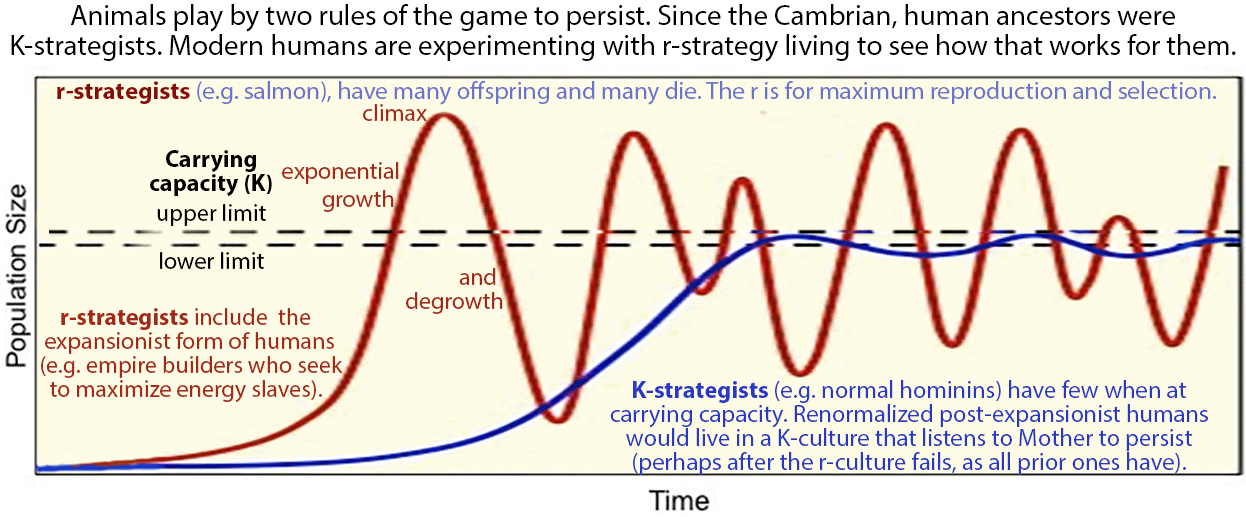
History notes that some humans appear smart compared to those who make lists of smart people. Some people with high IQs are so challenged that they think they can assess the IQs of historical persons, e.g.:
- Johann Wolfgang von Goethe – IQ 220
- William Shakespeare – IQ 210
- Leonardo Da Vinci – IQ 200
- James Clerk Maxwell – IQ 197
- Voltaire – IQ 195
- Isaac Newton – IQ 192
- Gottfried Wilhelm Leibnitz – IQ 191
- John Stuart Mill – IQ 190
- Marie Curie – IQ 190
- Aristotle – IQ 185
- John Stuart Mill – IQ 183
- Galileo Galilei – IQ 182
- Avicenna – IQ 180
- Hypatia – IQ 180
- Nicolaus Copernicus – IQ 180
- Baruch Spinoza – IQ 175
- Michael Faraday – IQ 175
- Albert Einstein – IQ 170
- Charles Dickens – IQ 165
- Benjamin Franklin _ IQ 160
Note, Richard Feynman (with a measured IQ of 124) does not make the list. Bottom line: the smartest guys in the room are too clever by half and not nearly smart enough to avoid serving modern techno-industrial (MTI) monetary society that selects for its own failure (and a ghastly future for posterity).
Who do super scholars think are the super smartest humans among the recently and still living?
- Stephen Hawking
- Edward Witten
- Andrew Wiles
- Grigori Perelman
- Ruth Lawrence
- Saul Kripke
- Akshay Venkatesh
- Shahriar Afshar
- Magnus Carlsen
- Evangelos Katsioulis
- Noam Chomsky
- Donald Knuth
- Alan Guth
- Nikola Poljak
- Scott Aaronson
- Terence Tao
- Garry Kasparov
- Ivan Ivec
- Steven Pinker
- Chris Hirata
- Richard Rosner
- Manahel Thabet
- Mislav Predavec
- Kim Ung-Yong
- Neil deGrasse Tyson
- John H. Sununu
- Marilyn vos Savant
- Judit Polgár
- Christopher Langan
- Paul Allen
Actually only two of the above are hyper-intelligent pan-dimensional beings, shape-shifters who have taken on the appearance of humans. Mentioning whom would be telling, which is not allowed.
If you are smart you’ll have noticed that I didn’t answer the question. Would turning all humans into super intelligent beings (with maybe an IQ of 124) help humans persist long term on the planet? Or would intelligence (the ability to discover truth) insure our demise and near-term extinction along with insuring that our current mass extinction event might rival that of the Permian?
I don’t know, and that’s because I’m not human. My people have spent over a hundred million years iterating towards having some knowledge of ourselves and our place in the cosmos. We know that we don’t know anything. We know that humans are a storytelling animal that tells no true stories. But maybe some are true.
We have some sense of the great ocean of truth that lies all undiscovered before us. We know that at best we can iterate towards truth, but we can never know it. The few humans in your history who seemed to understand their limits were not human.
Will humans yet awake? Will they persist in loving the smell of hubris in the morning (until they can’t)? Will they ever know humilitas? The next few decades will tell the tale inscribed on their believing minds.
348. What practical solutions do we have to tackle the growing population of our planet?
[Two views before a Quora moderator hide the answer from everyone be me.]
Population is one of our problematiques, aka ‘wicked problems’ that most people handle by refusing to think about it or imagining solutions that are not. Denial works, for a time.
All problematiques are sub-problems of the problematique, the wicked problem, which very few can name (overshoot) or think about. All wicked problems are interrelated and so any practical solution to any one sub-problem would have to solve the whole shebang of wicked problems, would have to be the solutionatique.
To understand the human predicament and that of any individual who would ask for practical solutions, I suggest considering an allegorical story as doing so allows for the needed objectivity to grasp our wicked situation.
Imagine it is 1963 and you are a reindeer on St. Matthew Island.

It is early spring, the females have yet to calf. There are 4,500 other reindeer on an island that 19 years ago 29 reindeer came to (no one remembers how). Each year is better than the last. There are no wolves on the island. Your prosperity is greater than your parents, and theirs was greater than their parents and so on back ten generations. You expect your calves to live a prosperous life too, more so than yours has been. How could it not be?
Well, you ask an ecologist reindeer (the only one on the island) and she explains exponential growth and carrying capacity. She estimates that if room is left for the voles and foxes, the long term carrying capacity of the island for reindeer is in the 500 to 700 range.
But…but you excitedly note, their are 4,500 now and everybody is doing fine. She nods sadly. ‘Let me tell you about overshoot,’ she continues. The short of it is that for the last seven years we reindeer have been in overshoot. In monetary terms modern humans can understand, the 29 reindeer inherited a billion dollars 19 years ago and lived on the interest for 12 years. Then to maintain and increase per capita consumption of the rapidly growing population, they started spending the principal. In the next year or two it will all be gone. And then what?
http://www.sustainable.soltechdesigns.com/over-carry.htmlYou go about the island and ask everyone the same question: ‘What practical solutions do we have to tackle our growing population on this island (it is not the reindeer’s island) whose environmental productivity we utterly depend on?’ You explain to each that for the last 7 years we reindeer have been incurring an ‘extinction debt’ that future reindeer (and many other species) will have to pay. You mention the obvious, that from now on there has to be fewer calves born (about 40 per year) than reindeer who die (unlike in the last 19 years) so the population can rapidly decline to about 600 who can live a good life as the centuries pass.
Each dismisses you with bemused tolerance. Each surveys their domain of mostly happy reindeer and foresee a future of continued growth. The reindeer demographer predicts that next year there will be 6,000 reindeer on the island and that in four years there will be 12,000 reindeer. All the reindeer economists agree that the island could easily support 24,000 reindeer. Everyone has agreed to discount what the ecologist has to say, and listen to the economists, political and religious leaders instead.
If you define ‘practical’ as politically and religiously acceptable such that at least 51% of citizens will vote to implement the solution, then all real solutions are excluded. Sorry about that.
349. If human species are gone, will it benefit the Earth?
We modern techno-industrialized humans are presiding over the greatest mass extinction event since the late Cretaceous, one that could come to rival that of the Permian. When the current plague-phase of humanity is over, whether because all humans are extinct or those that remain live foundationally different lives by living within limits, it will take 10 to 20 million years for biodiversity to be regained.
From the point of view of life on Earth, this will be a benefit. If humans come to understand the planet and learn to live properly with it, then humans could become Earth Guardians. Perhaps if humans come to work effectively to restore the biosphere, recovery could take less than 10 to 20 million years. Humans are the only animal that could detect a comet or asteroid on a collision course and perhaps be able to alter its course. It is possible that humans could come to prevent a mass extinction event instead of causing one. That humans could benefit the biosphere is a conjecture. That we are harming it is a fact only a human could deny.

350. Why do we all act like everything’s okay (food shortages, water shortage, climate change, microplastics)?
[Moderated out with no views.]
As E.O. Wilson noted, ‘people would rather believe than know’. Mark Twain reminds us that ‘denial is not just a river in Egypt’. For most people, an idiot is anyone who doesn’t tell them what they want/like to hear. Killing messengers is a favorite indoor sport.
People who endeavor to listen to Nature (scientists) are especially likely to be dismissed as idiots. But scientists must endeavor to not listen to human prattle about what is out there. Nature, the nature of things, alone determines what-is. Look around. See problems with no politically acceptable solution. Be ignored, denied, misunderstood, or obfuscated remorselessly.

